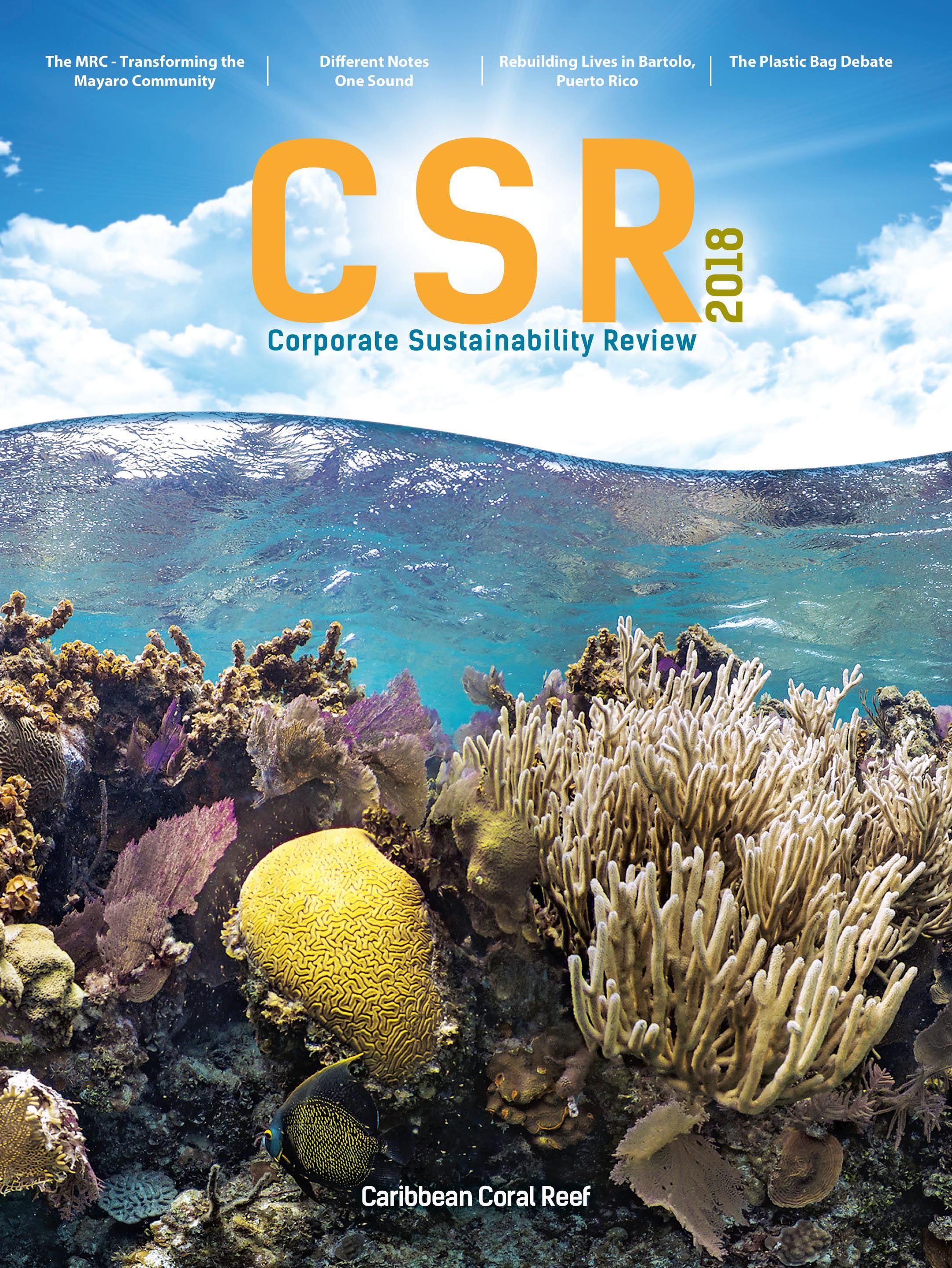

Corporate Sustainability Review 1 Contents Editorial 3 CSR Stories POWERGEN PowerGen’s Special Children’s Fun Day 4 First Citizens First Citizens Banks on Productive Entrepreneurs 6 bpTT The MRCTransforming the Mayaro Community 9 ATLANTIC In the Market for a Loan? 14 NGC Youth In Focus 17 Nestlé Enhancing the Talent Pool 21 SHELL Shell and Invaders ... Together Again 25 Conscious Leader NGC’s Mark Loquan 27 Caribbean Perspectives Rebuilding Lives in Bartolo, Puerto Rico - Partnering and Collaboration for Sustainable Development 31 Business and CSR go hand-in hand at Sandals - Cricket, Coral Reefs and Caribbean People 34 Opinion Jobs Are Not Enough The Private Sector’s Role in Creating a Safer Society 37 Fostering Youth Enterprise Why We Should Do It and How 39 The Employment Alternative Youth Entrepreneurs and the Rise of the Gig Economy 41 Too Few Female Entrepreneurs & Investors How Women Entrepreneurs in the US Overcome the Challenges 43 Feature Story Transitioning to a Blue Economy Our Island States in the International Year of the Reef 46
The Corporate Sustainability Review features the unique social programmes and experiences of companies from a wide range of sectors including Energy, Finance, Manufacturing, Telecommunication Services, Retail and others as they strengthen communities and transform lives across the Caribbean region.

www.virtual-tt.com
Editor-in-Chief
Donna P. Ramsammy
Deputy Editor Wendy Singh
Contributing Editor Joann Carrington
Art Director
Lynn Designs Limited (868-789-0351)
Advertising
Virtually Yours T&T (VYTT)
Production Coordinator
Valery Marin
Publisher VYTT
Photography
PIPS Photography
Photos for CSR stories supplied by the featured company Shutterstock.com
Printers
Office Authority Ltd., Trinidad and Tobago
Contributing Writers
Pat Ganase
Jaysen Francis
Kyle Santos
Monique Mata
Saarah Khan
Wendy Singh
Featured Writers
Ryan Seemungal
Palko Karasz
Paula Fernandes
Publisher
Virtually Yours T&T Ltd; Francis Lau Street, Woodbrook, POS
Phone/Fax 1.868.622.2663
Email: team@virtual-tt.com
On the cover:
Caribbean coral communities create massive and unique underwater structures, providing surfaces and spaces that can be utilised by other marine life.
Feature Story (continued)
Brand Activism
The Relevance of Brand Activism to CSR in a Caribbean Context 50
Footprints in the Sand
Personal Responsibility in Dealing with the Phenomena of Coastal Debris 52
The Plastic Bag Debate
Caribbean and International Perspectives on Bans on Plastic and Styrofoam 54
Wave after Wave of Garbage hits the Dominican Republic 58
Bringing CSR to the Homefront 60
Kansmacker Recycling
Can the private sector save us from our garbage? 62
2018 edition
Photo credit The Ocean Agency/ XL Catlin Seaview Survey
It’s been a challenge getting to the bottom of what’s happening between business and society this year. Professionals in the area of CSR have been lamenting cuts in budgets at a time when more and more people are in need of corporate help to address the fallout from suppressed oil prices and a concomitant burgeoning of unemployed youth and young adults. Unfortunately for many, with a “last in, first out” policy adopted by most businesses, it’s the new graduates and young hires that are feeling the effects.
So how are businesses working to address the obvious impacts for unemployed youth? This year the CSR asked businesses to tell us what they are doing in the area of youth development and entrepreneurism to combat the growing numbers of qualified-and-keen-to-work young persons seeking job opportunities.
Our writers have been looking at those alternatives to traditional employment as a new imperative for job seekers. Some of the responses are focussed on training and education in non-traditional businesses like the arts – specifically steel band music as a commercial opportunity, micro-enterprise initiatives in rural communities, capacity building for NGOs and CBOs, training for new entrants into the word of work, and strategic partnerships with law enforcement agencies. Beyond the traditional interventions in CSR, one writer has looked at environmental responsibility in caring for the oceans and how we dispose of waste. Certainly, this is an area that can be looked at for creating new jobs and business opportunities.
In this issue, writer Jaysen Francis speaks to millennials about the “gig economy” as he promotes start-ups (SOHOs) as the career alternative. Saarah Khan, another features writer believes that “the role of the government and policymakers
is vital in fostering an entrepreneurial ecosystem.” See her article “Fostering Youth Enterprise - Why We Should Do It and How”.

Atlantic’s Lend Agency supports community entrepreneurs and markets, and turns business into profit centres for families and sole traders, while bpTT’s Mayaro Resource Centre is a model for how collaboration can transform communities and create self-sufficiency. Nestlé Needs YOUth (NNY) management trainee programme is enhancing the talent pool to create a cadre of business-ready young professionals.
“Jobs are not enough” says writer Kyle Santos as he addresses the private sector’s role in creating a safer society. Also on the issue of crime, the CADV is promoting zero tolerance in the area of domestic violence in T&T. Mindful that critical support systems such as the police, courts, health services and other social services were woefully inadequate and unresponsive to victims’ needs, the CADV is investing time in training and encouraging businesses to support the call.
Lisa Burkett of NGC tells us how “making a difference to at-risk youth requires a balance of patience and support, a keen balance of resources, dedicated time and a simple respect for humanity.” Her company’s work with Police Youth Groups and in the field of Arts & Culture she believes, have the potential to propel young persons to purposeful and fulfilling careers.
Shell Trinidad is back in the Savannah after a 44 year hiatus. They have resumed sponsorship of the Invaders Steel Orchestra. Derek Hudson, Vice-President of Shell Trinidad and Tobago describes the partnership as “an ideal opportunity to support indigenous culture and promote the national instrument.”
Just as we were about to go to print, T&T launched its campaign to eradicate the use of styrofoam from 2019, with an immediate ban on the importation of styrofoam products into the country. It was timely for us as our cover story introduces a new area for social investment - CSR of the ocean and waterways. The supermarket plastic bag debate and coastal debris in the Dominican Republic are stories not just for T&T but lessons for the region.
Donna Ramsammy EDITOR-IN-CHIEF
Corporate Sustainability Review 3 Editorial
Powe R Gen’S S P eC ial Child R en’S Fun day a Celebration of diversity and inclusiveness
Every year, for the last 26 years, the PowerGen ground in Syne Village, Penal transforms into a kaleidoscope of colours as over 1500 colour-clad young children and teens, some with walkers, wheelchairs and walking aids and accompanied by teachers and parents, converge excitedly for a day of sheer fun and complete abandonment.
The Special Children’s Fun Day hosted by PowerGen is a major must attend annual event on the calendars of over 35 schools throughout Trinidad and Tobago whose differently-abled students participate in the popular and very competitive march past and engage in thrilling games including potato shuttle, rabbit hop, piggy-back race and the wheelchair race. Speaking about the concept of the Special Children’s Fun Day, Francois Ottley, PowerGen’s Senior Corporate Communications Specialist said the event was all about differently-abled students having a special day all to
themselves. “It’s an opportunity to bring them out to experience a sports day and experience a fun day because often times, schools for the differently-abled are challenged to get funding and they would not be in a position to have their own school fun day. That was the idea behind this event,” he said.

The event began when employees of the then TTEC in Penal pooled their money and conceptualised and supported a special children’s fun day and the annual activity continued when PowerGen became their employers. PowerGen also supported the special children’s fun day at management level and soon it became a major part of the company’s CSR activities. In the 2018 fun day, a contingent of differentlyabled students from Barbados participated and there are plans to invite another Caribbean country to the event in the near future.
Gail Spann from Eshe’s Learning Centre said the fun day is a major highlight for students at the school from the time they enter the PowerGen-sponsored transport bus to take them on their journey to the Penal ground. “Our children get to interact with other children with other types of learning disabilities or differences,” she said, explaining that students at Eshe’s are “cognitively delayed” and their “disabilities are hidden and they look like any ordinary primary school children.”
Spann added, ” At the fun day, they are able to interact with children of different disabilities, getting to meet and greet with children from other schools and getting to appreciate and see some of the differences in people throughout Trinidad and Tobago, so it’s really good.”



Spann said although other companies engage in a myriad of activities for differentlyabled students, there is a special relationship with PowerGen. “Our experience with

4 Corporate Sustainability Review
CSR Story
GM Mr. Surindranath Ramsingh gets a warm greeting.
Fastest wheels on the track. Can’t stop this winner.
Two happy winners.
PowerGen is different,” she said recalling on occasions when they did not deliver their information in time to be part of the fun day, the committee overseeing the event displayed a high level of understanding. “They go out of their way…everything in my opinion works well,” she added.
Marsha A.J. Williams of Point-a-Pierre Government Special School said the annual event provides them with an opportunity to meet with other special needs schools and allows students to participate in fun events that cater for their needs within their limitations. “Our students look forward to the day out to meet with friends and to take part in the events that they are able to. It is usually a fun day out. We appreciate the gesture that this company does for us each year. (They) are one of the few companies that consider our differently-abled members of society.”
New Beginnings Educational Centre which has been participating in the fun day over the last 10 years gave the annual event high ratings. Phillis Griffith said students at the centre are always excited to be part of it. “Special schools get a chance to interact and participate in an environment that they are comfortable in,” she added.
Many other schools that regularly participate in the fun day made similar remarks. “This event gives our students opportunities for showcasing their skills, socialising, selfregulation skills and most importantly, having fun,” said Lillon Ryan-Dick of Learning Is For Everyone (L.I.F.E) Centre.
Michelle Lashley-Bisram of Care Helpers Organisation of Trinidad and Tobago, “I like that all can participate and feel important. This event means our parents and their children would be able to socialise with other children and schools with special needs individuals.”
Candace Picton of Princess Elizabeth Special School, “I liked the management meeting children, giving medals to those that can’t participate.” The fun day event is eagerly looked forward to by students of the school. ”They enjoy meeting old friends as well as new. They look forward to the march past and have fun.”
Kevon Mitchell of School for Blind Children especially liked that “a medal and token is catered for every child regardless of disability or special need and also their participation in the event.” The annual event is special for the students. “Some schools have their internal sports but this is the sports day that all students look forward to.”
Like other companies, PowerGen faced budgetary constraints which challenged some of their activities but as Ottley noted, the annual fun day event was vigorously defended

and justified. “Members of the Committee said it cannot be the special children funding. That shows how important this activity is to us.”
The Senior Corporate Communications Specialist said PowerGen has been achieving its objectives every year when they host the fun day for differently-abled students. The event is also heavily supported by PowerGen’s management and foreign shareholders from the United States and Japan travel to Penal to be part of the day’s activity.
PowerGen’s CSR activities are focussed on able bodied youth involved in sports and education and the company has been the proud sponsors of the Secondary School Cricket League for the past 23 years.
For the differently-abled, it’s about inclusion and raising their self-esteem. “The first time I went to the fun day, I was emotional seeing some of the students and one of the teachers told me that they (the students) don’t want pity. They want love, attention and support and it was a good learning opportunity for me,” said Ottley.
Planning for the 2019 Special Children’s Fun Day is already underway for another bumper event. Taking into consideration feedback from stakeholders on further improving the all-day event, Ottley said it’s all about expanding and improving every year for the benefit of the very special invitees.

Corporate Sustainability Review 5
Happy to rally for her team in the march past.
Play for gold.
Fi RS t Citizen S bankS on PR odu C tive ent R e PR eneu RS
Knowing that small and medium enterprises employ an estimated 200,000 people and generate some 30% of T&T’s GDP, a smart financial institution might find itself particularly committed to a CSR platform that encourages entrepreneurship and improved productivity.
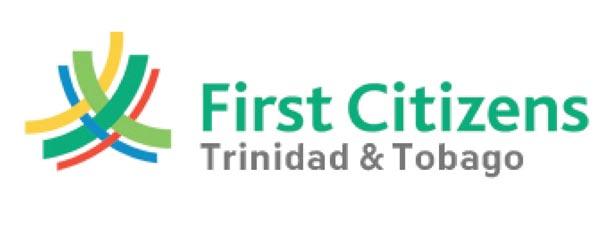
First Citizens has embraced ongoing relationships with three organisations that focus, directly and indirectly, on just such a platform.
1) AMCHAM T&T launched the National Youth Productivity Forum (NYPF) in 2009. “We didn’t like where we (as a country) were heading in terms of productivity,” says Melissa Pierre, AMCHAM’s Senior Trade and Projects Officer, “hence we came up with this forum.”
Title-sponsored by First Citizens since 2016, it attracted 28 secondary schools in 2018, with just under 200 students discussing the effects of health on productivity – from the perspectives of Business, Government, Labour and Civil Society.
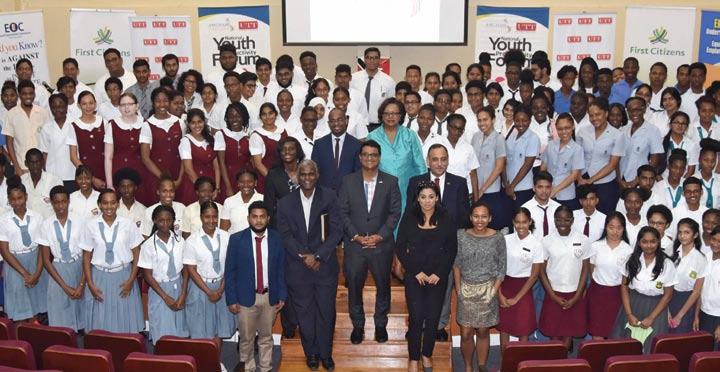
The students are prepped for debate by subject experts, like the public health doctor who lectured them in 2018 on the cost of diabetes to employers, before moving on to a moderated discussion where they can question their rivals and fact-check in real time on internet-connected laptops. “The children are usually very passionate about it,” says First Citizens Corporate Communications Manager, Dexter Charles.
Under the forum’s entrepreneurship component, one school manufactured a run of citronella-infused garbage bags for deterring mosquito-breeding in discarded containers.
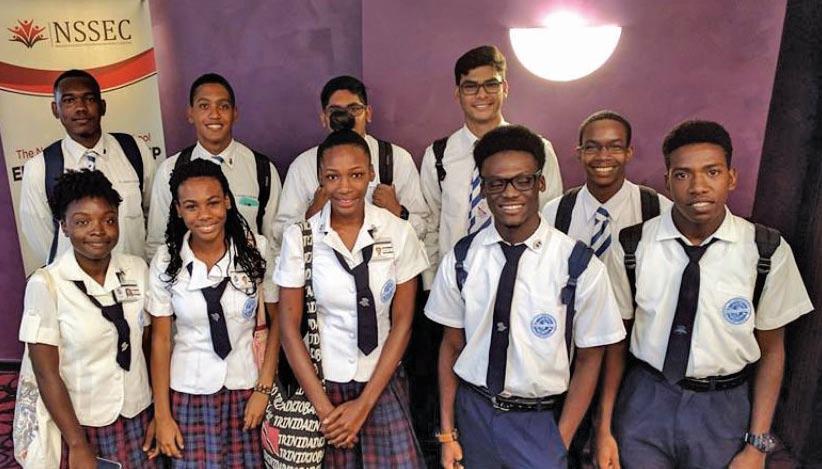
Pierre says the First Citizens sponsorship has lent credibility to the AMCHAM forum, and made it possible to feed and transport the students and teachers who take part.
“It’s not a typical debate – we do not have ‘for’ or ‘against’. What we do is we have students discuss topics from different perspectives, therefore recognizing that solutions aren’t with any one group and it really requires a sort of cooperation.”
Melissa Pierre, Senior Trade and Investment Office at AMCHAM T&T, organiser of the National Youth Productivity Forum
6 Corporate Sustainability Review
CSR Story
Within the First Citizens’ sponsored group of youth entrepreneurs were: Chaguanas North, International School Port of Spain, Mayaro Secondary, Corpus Christi, Woodbrook Secondary, El Dorado, Miracle Ministries and Holy Faith Convent schools.
Launch of the 2018 National Youth Productivity Forum.
2) The New Fire Festival started in 2016 and for First Citizens it was a case of finding something much bigger than they were seeking. “We were looking for something in the space of ecological responsibility,” admits First Citizens’ Dexter Charles.

The Festival, described by its organisers at the non-profit Trinidad and Tobago Bridge Initiative as a transformational event that gives people the tools to lead more sustainable lifestyles, is certainly green. In 2018, they promoted zero waste by restricting single-use plastics and encouraging festival goers to walk with their water bottles and food containers as they camped and visited food vendors, yoga workshops, performances and an artisans’ market.


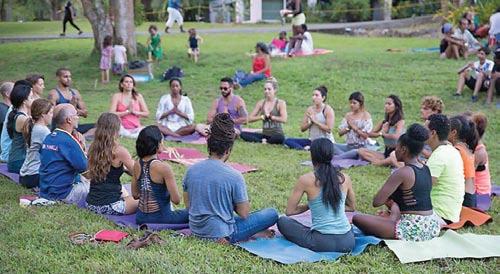

But New Fire also created a space for volunteers, many of them millennials, who were exposed to the complex logistics of organizing a multi-day event and had opportunities to meet like-minded people. “They’re able to leverage those connections in the future,” says Trinidad and Tobago Bridge Initiative Director, Elize Rostant. “So we’ve had people who have gotten jobs after volunteering because they met somebody, a different stakeholder, at the festival.”
“People follow us on Instagram and get excited when we make the call for volunteers. And what we’ve found is we have a lot of people that are looking to apply what they’re learning in school to the real world, and we provide them with that opportunity.”
3) When the National Secondary Schools Entrepreneurship Competition (NSSEC) launched its business simulation marketplace in 2017, First Citizens was drawn to the novelty. “What attracted us was that it was innovative,” says First Citizens’ Dexter Charles. “They sought to use technology in ways that we have not particularly applied it so far, as a culture.”
Teams of five students made decisions in an online computer store, designing products and setting prices for different machines for distinct target markets. The competition lasted six weeks and it was fierce, with five full scholarships at the Arthur Lok Jack School of Business at stake.
Each team created its own management structure, with some trending towards joint decision-making and others electing a chief executive. In a letter endorsing the competition, the Principal of Parvati Girls’ Hindu College admitted to “heated discussions” that developed conflict resolution skills.
Competitors learned business principles and made mistakes in a space where it was safe to test business theories because the currency wasn’t real but market responses are designed to mimic reality. Sixty schools competed in 2017. Over 100 are expected to participate in 2018.
“One of the things I said at the opening ceremony is, ‘Don’t be a sore loser. You may be doing business with one of these people one day in the future. Business relationships start at this age.’ ”
David Stone of 3Stone Research and Consulting Ltd., organisers of the National Secondary Schools Entrepreneurship Competition
Corporate Sustainability Review 7
Elize Rostant of the Trinidad and Tobago Bridge Initiative, organiser of the New Fire Festival
Her Excellency Paula-Mae Weekes and the Hon. Anthony Garcia in attendance at the NYPF Closing Ceremony.
New Fire Festival photos by Joshua Cazoe
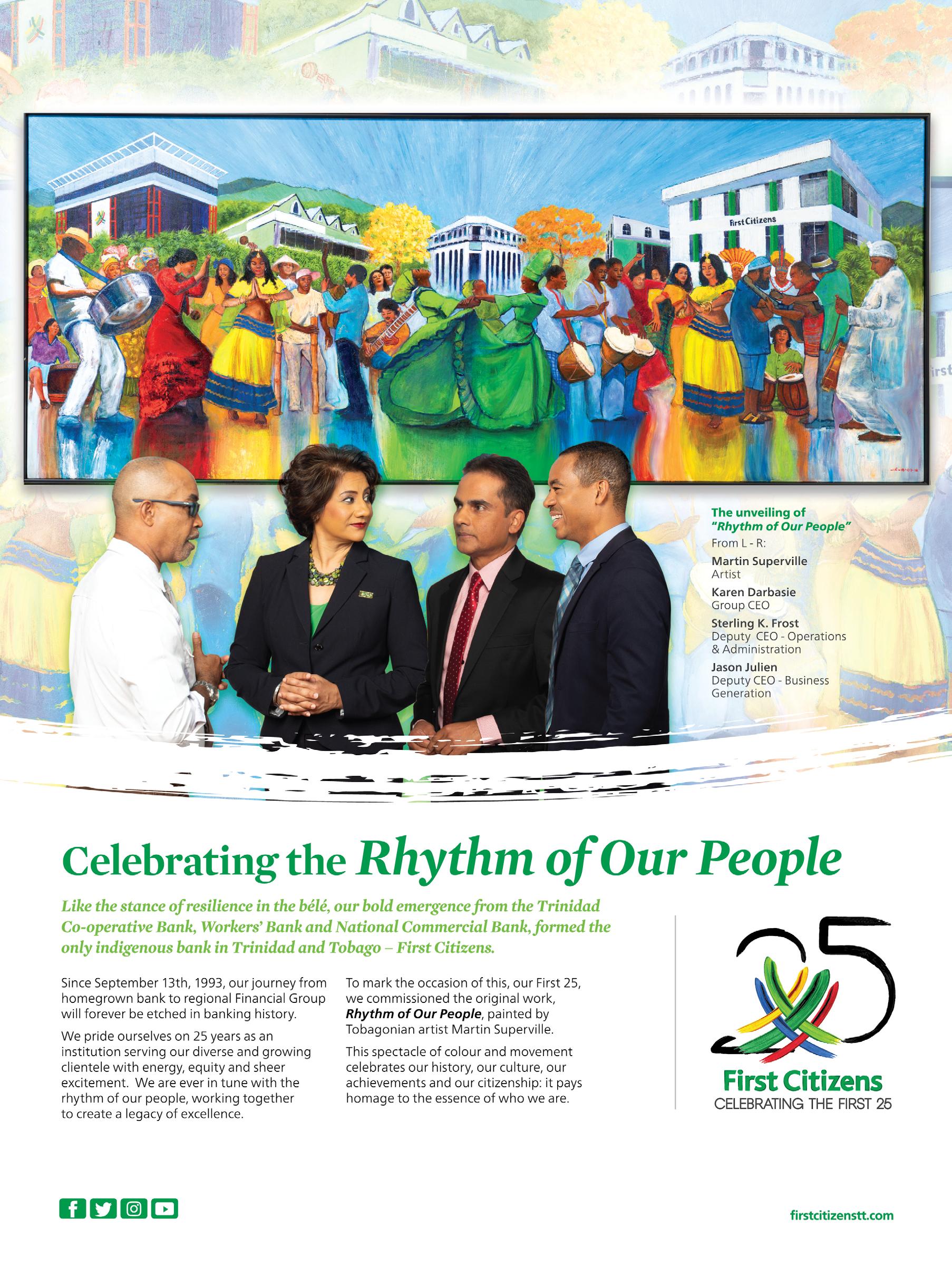
t he MRC transforming the Mayaro Community
For generations BP Trinidad and Tobago (bpTT) has been breaking bread with the Mayaro community. Though BPTT’s head office is based in Port of Spain, its major operating sites are located offshore in the Columbus Basin and onshore in Mayaro. Together, the company and the community have developed a mutually beneficial relationship that has transformed Mayaro.
Transformation is never easy. Going into the community, the company wanted to galvanize support for their development programmes while creating shared value between community and company. But there were difficulties along the way – creating shared value requires time and understanding and the passion for developing trust with stakeholders.
As a first step, bpTT representatives garnered the support of key community leaders and began attending regular meetings with a number of stakeholder groups. These meetings soon culminated in an opportunity to hear from multiple audiences at the “Sustainable Development Conference” sponsored by the company in 2001.

Hearing is important, but listening is divine. The conference became a turning point in transforming the relationship between bpTT and the community. We listened to the Mayaro residents’ concerns and together were able to make incisive interventions in the areas of education, enterprise development and capacity development. In keeping with the spirit of transformation, bpTT created a new vision for its old Amoco Sports Club. The club an exclusive, employee only designated enclave, was transformed into to a multi-purpose best in class community hub for educational, vocational, sporting, and recreational activities. This records the birth of the all-embracing and all-inclusive Mayaro Resource Centre (MRC).
The MRC is comprised of office space, several classrooms, a state of the art conference room, an auditorium, modern kitchen facility, bar, gymnasium, an aerobic room, a 25-metre
swimming pool, a tennis and basketball court and over 16,000 square feet of playing fields for football and cricket (with a turf cricket pitch). Since opening its doors in 2003, the MRC has served more than 200,000 people.
However, the change from sport club to all encompassing community centre wasn’t just about brick and mortar. The MRC is a home for bpTT’s corporate responsibility initiatives in Mayaro – those same initiatives developed out of conference in 2001 and others. The MRC is the base for three of its key flagship social investment programmes in education, entrepreneurship and capacity building:
• The Brighter Prospects Scholarship Award –addressing the lack of tertiary level educated persons in the community, this programme distributes scholarships to students with the academic ability but without the financial means to participate in education at the tertiary level.
• The Mayaro Initiative for Private Enterprise Development – addressing the high level of unemployment in the community, this programme provides micro-credit to individuals from Mayaro who would like to start businesses in Mayaro. Entrepreneurs are also offered support in the development of their business plan and throughout the loan application process.
• NGO/CBO training – addressing the low levels of skills attainment in the community, this training opportunity seeks to strengthen the institutional capacity of NGOs and CBOs in the community. Participants are trained in a wide variety of field from financial management and reporting to ICT.
It is important to note, that the MRC does not only host bpTT’s CSR programmes but is also home to the CSR initiatives of our energy partners. For example, another major operator uses the MRC to host its longstanding homework centre. Even the government makes use of the facility for its SPORTT camps and as a designated shelter in case of a natural disaster.
Corporate Sustainability Review 9
CSR Story
Members of the community also have access to a range of other activities at the MRC. Mayaro’s residents can enjoy everything from aqua aerobics to zumba at the centre. The MRC is also available for rent at a highly subsidized fee and has hosted conferences and workshops, car shows and fete matches, graduations and anniversary celebrations, and family days and weddings. One resident Janice Cameron shares her story. She’s raised her three children in Mayaro and enthusiastically announces that her entire family makes use of the facilities at the MRC. She lives and works in the community. She has a number of vocations – nail technician; massage therapist and because of her interaction with community members attending aqua aerobic classes at the MRC swimming pool, she also became a certified swim/aqua aerobics instructor. She proudly boasts of this achievement and attributes her new found passion to the MRC, saying “it [the MRC] has expanded my life and the life of my family.”

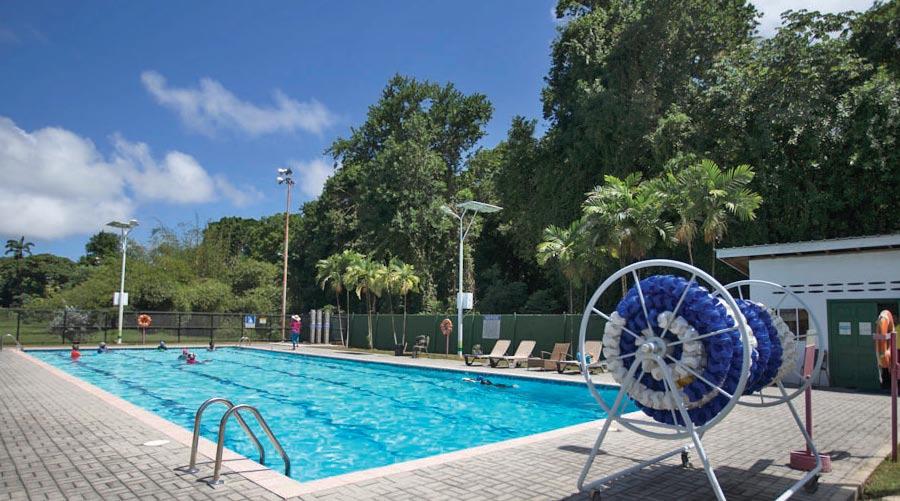
“We can see how our community has changed and continues to grow and I am really happy to be a part of that. For my own family…I [have] see[n] great improvement in our physical health [and] we’ve also come to enjoy the association [with the MRC] - it is a great place to meet people. When I attend consultations, classes at the pool or use the centre’s gym, I have so many networking opportunities,” Ms Cameron offered. “We get to know our neighbors better, share knowledge and learn more. The MRC has improved our entire well-being. We have experienced improvements all round: physically, mentally,

10 Corporate Sustainability Review
tRanSFoRMinG the MayaRo CoMMunity (continued)
The 25 metre swimming pool is scaled for competition.
Smart technology is put to use in the conference room.
The meeting and training rooms are fitted for multipurpose use.
economically, so much so that I have been encouraging others to take advantage of what we have in Mayaro. Every chance I get I tell other people about the benefits of using the Mayaro Resource Center and how to cherish it.”
The vast number of programmes at the MRC encourage community stakeholders on a path towards selfdetermination and self-actualization.
The Mayaro Resource Centre has literally become an incubator for ambitious scholars and entrepreneurs, a space that fosters making new connections and developing relationships, strengthening the bonds between families and neighbors. It is a space where dreams are shared and vision is encouraged.
Ronda Francis Corporate Responsibility Manager at bpTT says, “The local priorities in the community are changing and the MRC is evolving to ensure that we maximize resources to serve the Mayaro people at the right time and in the right way. The MRC enables us to deliver those services in a streamlined, coordinated, integrated and locally tailored way. Our aim is to bring solutions closer to residents. In addition to these services, we are planning to introduce an entrepreneurship development centre into the MRC.”
It is clear to see that the MRC is more than just a multipurpose facility, it is a symbol of transformation and a beacon of hope for the Mayaro community. It is a place where bpTT has made a real investment in developing the skills-set of the community in which they operate while providing a space for the community to share learnings and build fellowship with each other. But perhaps the story of the MRC is most succinctly told in the words of
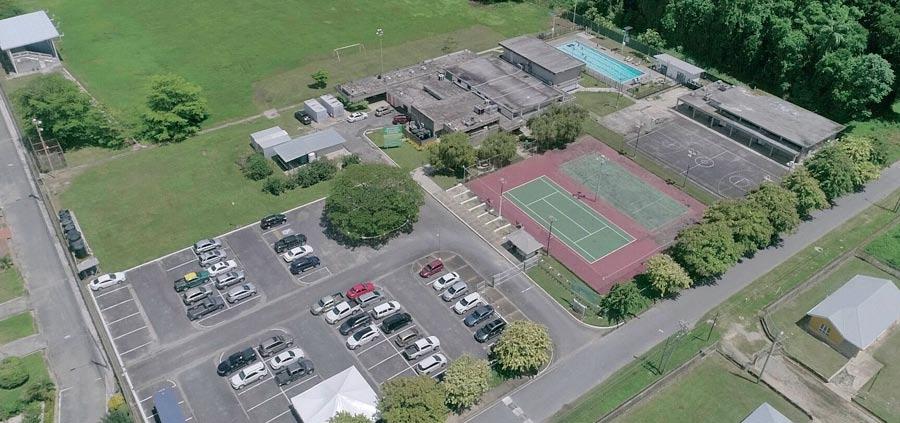
community leader and a pioneer in its transformation, Mr. Gregory Galera, when he said, “In the past, the history of the MRC was that it was this exclusive place. It was a club that could only be used by employees of AMOCO, but the community understood that the club could serve Mayaro in a better way. The transformation of the Amoco Sports Club to the Mayaro Resource Centre encapsulates the story of the struggle between the multinational, BPTT, and the community, and what can happen when people put aside their differences to work together for the sustainable benefit of all. Today, the MRC is a focal point in the community, it is a place that we can recreate, have outreach and all types of functions. I feel so proud of the community, to see people from the community not only utilizing the facility but also having a pivotal role in managing it on a day to day basis. The MRC is far different, more profitable and more beneficial to Mayaro than it was in the past. It is a beacon of hope for the community and I hope that it remains that way.”
Core Values of the MRC
i. Customer Care and Services
ii. Respect for the Human Being
iii. Commitment to the attainment of the mission and goals of the MRC
iv. Team-Work
v. Professionalism in all undertakings
vi. Safety & Security
Corporate Sustainability Review 11
An aerial view of the Mayaro Resource Centre.
12 Corporate Sustainability Review MAYARO IN NUMBERS

i n the Ma R ket F o R a loan?
The LEND Agency supports community entrepreneurs and markets, and turns business into profit centres for families and sole traders.
A popular nuts and channa vendor purchased a new stove. The DJ bought a state-of-the-art customized stage for Point Fortin’s Borough Day and other events. Fisherfolk and farmers acquire timely injections of funding to keep their businesses growing. The coconut oil processor sells out his stock after every crop. The bee-keeper has expanded into other bee and honey products. Over 300 small enterprises are allowing owners and proprietors to support families and employ others; to attract suppliers as well as customers and clients to participate in the thriving small business sector that’s growing in Trinidad’s southwest peninsula.
That’s no small achievement in an area of Trinidad that has recorded high unemployment rates and low numeracy and literacy up to the time of the last census (2011).
The Loan for Enterprise and Network Development (LEND) agency was established by LNG producer Atlantic in Cedros in 2014 to serve the communities in Trinidad’s southwest peninsula: Buenos Ayres, Icacos, Cedros, Santa Flora, Palo Seco, Point Fortin and La Brea. LEND offers financing to micro, small and medium enterprises (MSME), sole traders and new entrepreneurs who might be ineligible for mainstream bank loans.
The LEND objectives are:
• To promote economic welfare in the communities of Trinidad’s southwestern peninsula, by facilitating new or expanded business activity in key non-energy sectors;
• To foster small and micro-enterprises that would be independent and self-sustaining, and contribute to local economic activity;
• To procure capital and to provide loans and guarantees for MSME and entrepreneurs;
• To offer and facilitate management and technical advice and services;
• To identify and disseminate information on business opportunities to generate employment, make use of local materials and/or local skills, or otherwise contribute to local expertise or economic activity;
• To enable access to skills training to support the economic development of the communities.
The LEND process is simple but flexible, tailored to the needs and potential of each business. Entrepreneurs are invited to visit the LEND offices in Bonasse Village, Cedros. Field officers also visit applicants in their communities and search out innovators and new potential business. The LEND structure is multi-layered. It begins with person-to-person interactions which are then followed up with a formal interview. The interview and a needs-analysis determines the viability of an enterprise. Recommendations are then put forward to a credit committee which makes final determinations about the longer term feasibility of the business, sizes of loans and repayment schedule. Perhaps because the process is so personal and tailored to specific needs, there’s low delinquency.
14 Corporate Sustainability Review
CSR Story
In the first year of operation in 2015, LEND disbursed 53 loans totaling one million TTD; in 2016, 93 loans totaling 1.8 million TTD; and in 2017, 151 loans totaling 4 million TTD. The LEND business emerged from the intervention to promote Local Economic Development (LED) in Point Fortin and environs, which was a collaboration of the InterAmerican Development Bank (IDB) and Atlantic, executed by the Trade and Economic Development Unit (TEDU) of the University of the West Indies St Augustine.
Following a series of LED consultations with various community stakeholders, the strategic direction emerged through a four-pronged approach: institutional capacity building; development of micro and small entrepreneurs through access to credit; increased employability of youth; and capturing and sharing learning.

Capacity building through numerous sport and education programmes has always been a cornerstone of Atlantic’s CSR strategy in southwest Trinidad. The most well-known of these must be the Point Fortin’s Finest Leadership Development programme, in which top SEA students are nurtured with grants for secondary school and later, tertiary level training of their choice. Over the years since 2000, some 200 youngsters have been enrolled. They enjoy regular group interactions are afforded internships at Atlantic and are encouraged to give back to their communities through leadership and mentorship.

The same careful, consistent and sustainable approaches have been applied to the needs of micro, small and medium businesses that lack the basic collateral and prerequisites to qualify for
loans in the traditional banking system. These small business operators may be at further disadvantages by having to operate in remote communities. These considerations led to the development of a business plan that could support the unique personalized micro-financing agency. LEND is a registered business with a board of directors experienced in the banking and business sectors. Its office was established in an area where traditional fishing and agricultural enterprises needed a boost. The small staff is well-known in the community. With continued funding and support from Atlantic, it is hoped that LEND will grow its annual loan portfolio to 10 million TTD in the next three years, by which time it expects to be self-sustaining.
The Micro, Small and Medium Enterprise sector (MSME) accounts for the majority of private enterprises in the Caribbean, and contributes more than 50% to Gross Domestic Product and employment. The sector also contributes significantly to female employment, poverty reduction and social stability. Nevertheless it remains a sector that is largely under-supported. Given the important role of the sector, the major challenge facing policy-makers today is to ensure that MSMEs receive adequate support needed to enhance competitiveness; maximise growth potential; and generate employment while contributing to gender equality, and poverty reduction. The Caribbean Development Bank in a 2016 report, made recommendations that the MSME
Development Strategy should adopt the three-tiered approach effectively implemented in Singapore, Korea, Western Europe, Costa Rica and other successful countries during the past two decades: First Floor: support at the first floor, focusing on productivity and product quality enhancements among MSMEs to strengthen competitiveness, job creation and GDP; Second Floor: strengthen and modernise the efficiency and effectiveness of organisations and other intermediary structures providing developmental and other services to the sector; Third Floor: formulating enabling policies, legislation and strategies thereby improving the business friendly environment for MSMEs.
Corporate Sustainability Review 15
Atlantic’s VP Corporate Operations Toni Sirju-Ramnarine, welcomes a new cohort of leaders to the Point Fortin’s Finest Programme.
Apart from microfinancing, LEND clients also benefit from advisory services tailored to the needs of their business.
(Excerpted from “Micro-Small-Medium Enterprise Development in the Caribbean: Towards a New Frontier”)

youth
A main tenet of The National Gas Company of Trinidad and Tobago Limited’s (NGC) Corporate Social Responsibility (CSR) Programme is Youth Development. Whether through sport, human and social development or arts and culture, the thread of youth is woven into every programme’s fabric. Central to these CSR programmes is also a focus on ‘at-risk youth’ – those who, given their circumstances and considering all variables, may appear to have a future with less-than optimal outcomes. NGC, through its CSR programmes, hopes to create an alternate future for these young people. In this review, NGC’s involvement in the Police Youth Clubs and in pan, will be focused upon as tools for reaching and shaping our nation’s youth.
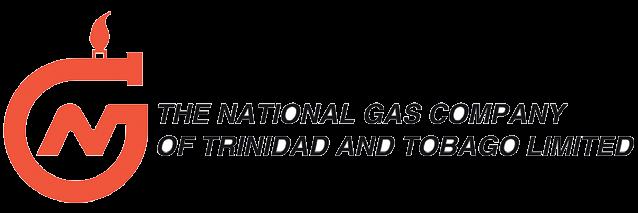
Police Youth Clubs
Through the support that NGC gives to its sponsored Police Youth Clubs (PYC), the company continues to position itself at the forefront of youth development in partnership with the Trinidad and Tobago Police Service (TTPS). These youth clubs offer programmes in education, sport, personal development, social activities and the preservation of indigenous art forms. Ages of members range from 3 to 25 years old.
In 2013, NGC began its sponsorship of PYCs located in Couva, La Brea, Laventille Road and Penal. By mid-2017, Mayaro had been added.
PYCs fall under the jurisdiction of the Community Policing Secretariat, which is an arm of the TTPS. Each sponsored club is governed by a Memorandum of Understanding (MOU) agreed by NGC, TTPS and the respective Police Youth Clubs. The activities which are offered through these PYCs provide the avenues to expose youth to positive and productive development and self-expression.
Intended to engage the youth membership of the clubs and cultivate positive attitudes and relationships, the programmes offered by the PYCs work as anti-crime initiatives, according to the TTPS. The leaders of the clubs are
equipped with management skills via leadership and capacity building training programmes. Parents, guardians and senior members of communities are also invited and encouraged to join the PYC management teams. NGC has also introduced systems to promote transparency and accountability and position the PYCs to be managed responsibly.
During the launch of the programme held in 2017 to confirm NGC’s continued support for its PYCs, Ernest Esdelle, NGC’s Senior Manager Engineering and Construction Services, who himself has special interest in youth development, spoke to an audience that consisted of senior members of the TTPS, including the TTPS Acting Commissioner, and 300 childrenall members of the five NGC-sponsored PYCs. He noted that the Police Youth Clubs arose out of the conviction that it was easier to build strong children than to fix broken adults. And this was an idea that NGC espoused.
“It is easier to try to positively influence the future of these children and the future of the nation by equipping young people with the tools they will need to thrive. In so doing, we hope they in turn will also be contributing to building our nation,” he noted.
NGC continues to actively collaborate with the administrators, employing new programmes and strategies to increase the impact of the PYCs on their target audiences – children; their families, their community and ultimately, Trinidad

Corporate Sustainability Review 17
in F o C u S
CSR Story
Gonzales Sheikers Music Literacy Graduation May 2017.
and Tobago. This approach according to NGC’s Manager Corporate Communications Lisa Burkett, “will advance the cause of positive change at the individual, community and national levels.”
One strategy is the assignment of community liaison officers, to strengthen the ties between the youth clubs and the community. NGC is also currently engaged in developing and applying customised measurement systems that will allow the company’s CSR team to track the impact of continuous programmes upon participants and the community at large.
Laventille Road PYC Steel Orchestra - a success
A beacon of the success of NGC-sponsored PYCs reaching at risk-youth is the success of the Laventille Road PYC and its steel orchestra. The Laventille Road PYC was first formed in 2011 and has over 80 active members. The Club has been sponsored by NGC since 2012, an arrangement that remains unbroken into 2018. The support provided by NGC allows the club to facilitate educational and character-building programmes including remedial math, English, karate and music.
The music programme focuses primarily on the steelpan, with the Laventille Road PYC Steel Orchestra becoming “the pride of the community.” The orchestra (and by extension the club) continues to afford young adults within the Laventille community a platform to refine their skills in playing the steelpan and reading music. This group, 40-strong, has participated in numerous competitions and reached the final
rounds of the 2018 National Junior Panorama competition in the Queen’s Park Savannah.
The PYC also participated in the 18th Annual Steelband Street Parade in August 2017. This was dedicated to the late soca artiste/radio announcer, Devon Matthews and the event was supported by over 30 steelbands. 2017 marked the sixth year that the Laventille Road PYC participated in the festival. The band entertained the crowd as they moved east along the Eastern Main Road and ended their performance and the night’s proceedings, with a lively performance of the popular tune, “Good Morning”. The performance of Laventille Road PYC is exemplary and representative of the results that the dedication of youth club leaders and members can achieve.
Myles Lewis, Head CSR (Ag.) at NGC, noted that “Providing activities that appeal to these youth, while providing safe spaces and opportunities for teachable moments, is essential to the success of our PYCs. We want the youth who participate to realise their fullest potential, which, for every citizen, means becoming a contributing and productive member of society. From a corporate perspective and as a state entity, building partnerships between agencies and youth development programmes that help reach out to a specific target audience is a responsibility we take seriously.”
Steelbands to steel-based industry
NGC is the title sponsor of NGC Couva Joylanders Steel Orchestra, NGC La Brea Nightingales Steel Orchestra and the Tobago-based NGC Steel Xplosion. The company also

18 Corporate Sustainability Review
youth in FoCuS (continued)
NGC Couva Joylanders Steel Orchestra performs at Panorama 2017.
provides assistance to Gonzales Sheikers Steel Orchestra. The sponsorship agreement with each band seeks to ensure sustainability. Bands are encouraged to develop businesses to support themselves. A partnership with an accredited educational institute is in an advanced stage of formalisation and will seek to deliver pan manufacturing and tuning skills to NGC-sponsored and assisted steel bands. The aim is to have resident personnel in the bands manufacture and tune their own instruments and in the future supply the market for pan instruments. Part of this programme is music literacy, which has always been a component of NGC’s sponsorship as it allows the band membership to create and score their own music, another avenue for entrepreneurial endeavour.
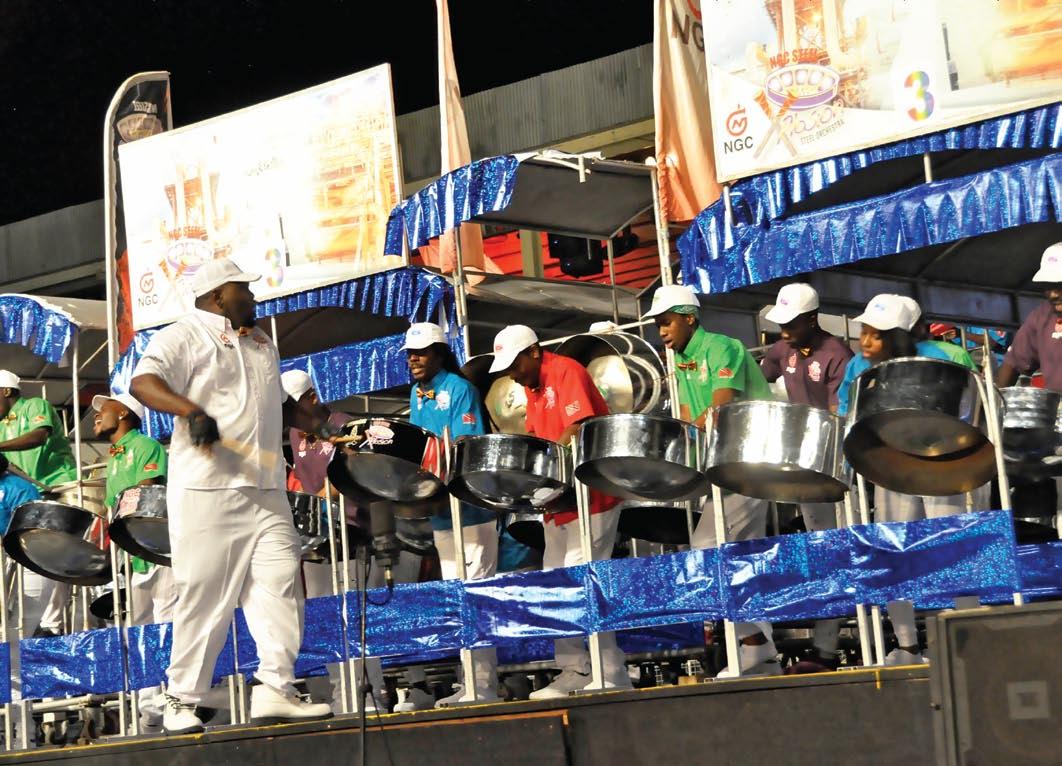
Propelling youth to success
Over the years, NGC has expanded its programmes to provide opportunities to young people, in many communities
across Trinidad and Tobago. Its support of sport runs the gamut of assistance at the primary, secondary, community and national levels. The Company believes as well in the preservation of national identity, and its support to Arts and Culture includes title sponsorship of the annual NGC Bocas Lit Fest as well as the NGC Sanfest within which the company insists on providing opportunities for those dedicated to the indigenous instrument. These initiatives have the potential to propel young persons – athletes, musicians, scholars – to purposeful and fulfilling careers.

NGC is cognisant that the PYCs and other NGC-sponsored programmes engage young people in intentional, productive, and constructive ways while recognising and fostering their strengths. These programmes promote positive outcomes by providing opportunities, nurturing positive relationships and giving the support that is needed to develop the talents of the nation’s youth. Manager Corporate Communications, Lisa Burkett summed up NGC’s focus on youth, a thread consistent in its CSR philosophy and suite of programmes by highlighting that “research indicates that young people who are surrounded by a variety of opportunities for positive encounters engage in less risky behaviours. This is indicated by higher rates of successful transitions into adulthood. Through our PYCs, our sponsored steel bands and other partnerships, we hope to realise this.”
Burkett further highlighted that “making a difference to atrisk youth requires a balance of patience and support of which NGC is aware and that a keen balance of resources, dedicated time and of course, a simple respect for humanity, can bring this hope to fruition.”
Corporate Sustainability Review 19
NGC Couva Joylanders Steel Orchestra members perform at their annual “Titans of Steel” concert 2017.
Tobago-based NGC Steel Xplosion.

e nhan C in G the talent P ool nestlé needs youth
Two years ago, Cavinne Gooding – UWI, St Augustine class valedictorian and national scholarship winner – found herself fresh out of university, working outside her field in a job that she couldn’t see becoming a career. She had hurdled a double major and was pursuing a Master’s degree after work, when she heard that Nestlé Anglo-Dutch Caribbean’s Trinidad and Tobago office was looking for management trainees. She decided to make a movie.
Recruitment and Employer Branding Manager, LaToya Birmingham. “But we want to increase the employability of youth.”
For the moment, Nestlé Anglo-Dutch Caribbean has focused on rolling out NNY in key markets where youth unemployment is highest and it’s likely to have most impact. Beyond T&T, the programme is up and running in Jamaica, Barbados and Guyana, with plans to expand to St Lucia this year.


Birmingham knows that young people are potential customers, but she’s also mindful of the company’s CSR mandate. “If our consumers are not working, or not being employed in a fruitful way, it affects everyone. The community around us is not going to be self-fulfilling. So that’s where the youth employment comes in and that’s why it’s such a key focus for creating Shared Value.”
Gooding’s video submission, the first step in a thorough interview process for the Nestlé Needs YOUth (NNY) programme, was one of hundreds received by the company’s Human Resources staff, many of them from over-qualified applicants who wanted to get in the door. “What attracted me was the interview process,” recalls Gooding, now a year-and-ahalf into a two-year rotation at Nestlé’s Finance and Control Department. “From right off the bat it told me that it was something different. You had to do a video of ‘why you’, and that tapped into my skill, so I did a real kind of movie production.”
The NNY programme certainly seeks Nestlé’s interest by casting about for the best and brightest between the ages of 16 and 29, but it also wants to influence and enhance the entire talent pool in whatever little ways it can. “The whole point is that we, of course, cannot hire everyone,” says
NNY outreach involves career workshops that impart simple skills, like helping job seekers craft effective résumés and career development plans. It also instils an appreciation of mentorship, which means finding that person with the experience and insight willing to steer them towards good choices.
Corporate Sustainability Review 21
Nestlé management trainee, Cavinne Gooding, shares her work experience with a UWI student at NNY’s World of Work, 2017.
CSR Story
LaToya Birmingham, Nestlé Recruitment and Employer Branding Manager (far left), NNY partners at Lonsdale Saatchi & Saatchi and Denise D’Abadie Corporate Communications Manager, Nestle (far right).
NNY has harnessed Nestlé’s in-house talent to spread the message about their company and how-to-stand-out in the wider working world. Management trainee Melanie Edmund, 18 months into her two-year rotation in Supply Chain, attended NNY’s “World of Work” at the University of the West Indies. “What I appreciate most about Nestlé Needs YOUth is that it’s not only targeted for you to have a career in Nestlé per se, but it would give you the skills and experience that you would need to be more employable throughout whichever sector, throughout whichever market.”
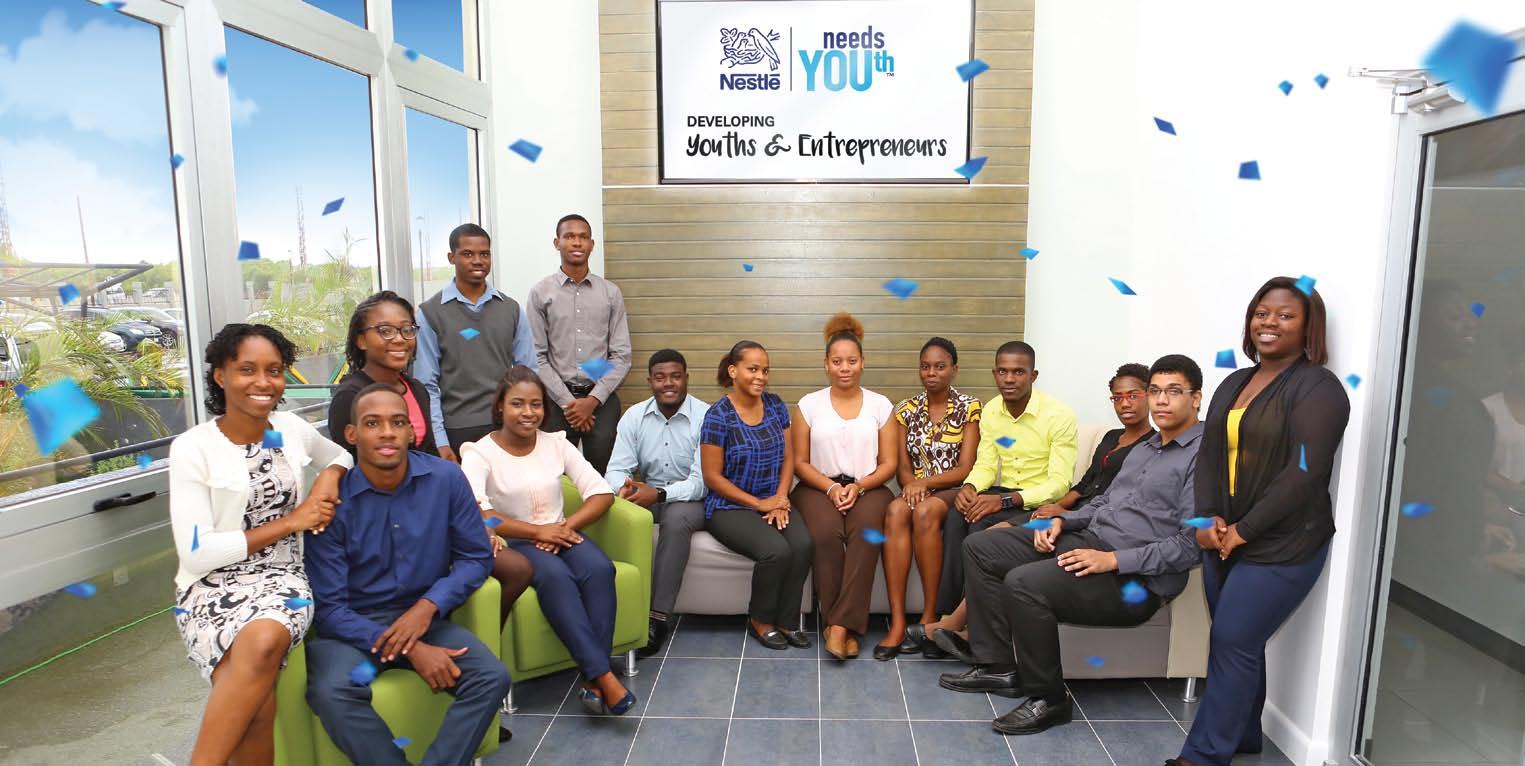
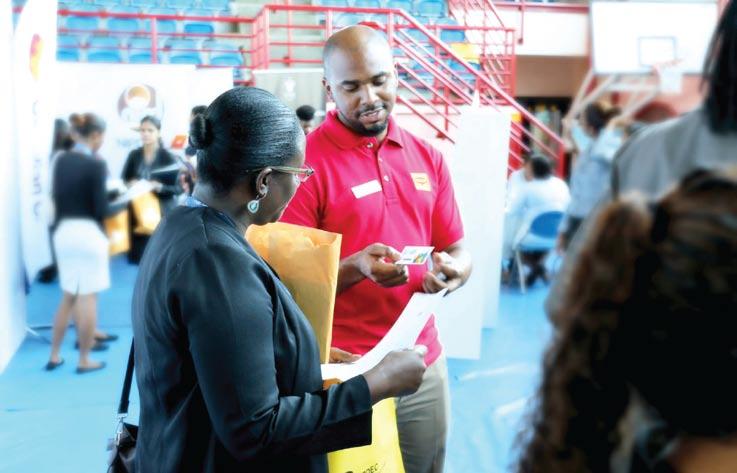
Gooding also passes on her 24-year-old insights to students standing apprehensively at the threshold of the working world. She knows what it was like, being in their shoes and craving opportunity. She also appreciates the benefits of fulltime mentorship. “So much of what you do in school is theory, theory, theory,” she says. “And you don’t see it put into practice. And to come into an organisation and see your books come to life or everything that you learned actually being applied in the real world and somebody to explain it to you and not just expect you to do it… Your job is to learn. Your job is to sit with the person who knows it all and let them explain, this is how it’s done.”
As the lead on NNY, Birmingham has a ready insight into her target market’s needs and anxieties. She’s not far-removed in age, studied psychology, and spent a year and a half looking for work herself. Presenting the programme to her younger self, she has a couple key
takeaways. “It’s about talking to students about how you humble yourself to take every opportunity: That one job you hated may open a door somewhere else. I tell them, ‘Apply yourself and people will see your work ethic.’ ”
Internships do lead to places young interns hardly expected. Mechanical engineer Hardeo Mithoon’s attitude was “so great” that Birmingham offered him a job in sales, where he used his aptitude for numbers to forecast his future sales. He now has a permanent job.
Through NNY, Nestlé has also been partnering with entities that share its commitment to youth employment –businesses, government agencies and tertiary education
22 Corporate Sustainability Review
Management trainee, Kellon Craig of the Trade Marketing department, at World of Work.
enhanCinG the talent Pool - nestlé needs youth (continued)
NNY interns, 2017.
institutions. A recent career development workshop with interns from advertising agency Lonsdale Saatchi & Saatchi saw knowledgeable young people with little workplace experience benefiting from insight into Nestlé operations and career opportunities. The agency says its interns benefited most from a CV-writing session, “a skill not necessarily taught in schools.”
Career prep fits nicely into Nestlé’s goal of employing more locals. Jobs at the multinational that were once staffed by expatriates are now being filled by T&T nationals. “We have that skilled labour here” says Birmingham. “We have it. And we have the educational facilities here to produce the talent that we need, so why don’t we use it?”
By the Numbers
Nestlé has been tracking engagement across Nestlé Needs YOUth. These are their 2020 targets and the actual figures as of May 2018.
NNY expansion
In Trinidad and Tobago, NNY is pushing into agri-preneurship
— where the company wants to show young farmers the potential to earn a good living with modern dairy farming techniques — through a partnership with the Ministry of Agriculture.

Corporate Sustainability Review 23
0306090 120 150 050 100 150 200 250 0102030405060 0 5000 10000 15000 20000

Shell and i nvade RS... together again
The relationship between Shell and Invaders steelband of Woodbrook harks back to 1960 when Prime Minister Eric Williams encouraged the business community to sponsor the nation’s steelbands. Shell was among the first businesses to step up and Invaders was its choice.
That sponsorship lasted until 1974, when Shell got out of the upstream energy business in T&T, but resumed in 2018, with the energy company back on T&T shores. “When Shell was approached it was an easy decision for us to make” says Derek Hudson, Vice-President of Shell Trinidad and Tobago Ltd. “The partnership was an ideal opportunity to support indigenous culture and promote the national instrument.”

Not only did Shell have a historic association with the band, but its new head office at St Clair Avenue put the Invaders panyard on Tragarete Road right within its notional “fenceline community.”
Shell is harnessing its corporate strengths – strong networking, good technical support and a lot of structure – to help Invaders realise their goals. The company is focusing on the band’s attributes, one of which is Invaders’ own structure. It’s one of the few steelbands in the country using corporate style management, with a board of directors that, the band believes, speeds up decision-making.

Corporate Sustainability Review 25
CSR Story
Shell celebrates with members of the Shell Invaders just after the band performed for judges at the Queens park Oval for preliminary judging.
After the Panorama dust had settled, Shell zeroed in on an area that they could really help with. The band has decided that they want to become bigger and better. Shell is helping with that through a feeder system - to use an energy term, a “pipeline” of young people.
Shell supports the growth and expansion plans through its sponsorship of the Pan in Schools Programme nationwide. This focus on youth fits nicely with Invaders’ desire to enhance its pipeline of young players. “It is so coincidental that their philosophy is in tune with our vision,” says Invaders’ Managing Director, Michael Dinchong. “Both parties look forward to the future and what could happen.”
What will happen is Shell and Invaders teaming up to focus on pan in schools within the fenceline community. And the Invaders youth band has already performed as the Shell Invaders Youth Steel Orchestra.


When Shell Invaders roll their pan racks onto the Savannah stage and the first notes of their Panorama arrangement burst into the night, it’s always a big moment. Bands need a sponsor’s support to meet the costs of competition. But there’s more to the partnership than Panorama: Shell and Invaders are a team, and both are looking eagerly to the future.

26 Corporate Sustainability Review
“Part of our extended family”, members of the Shell leadership team with the Shell Invaders players: from left Arrdin Herbert – arranger, Derek Hudson VP and Country Chair Shell TT, Colette Hirstius – General Manager Developments, Shell, Allison Auguste – Business Opportunity Manager Shell, Desiree Myers – Shell Invaders and Candice Clarke Salloum External Relations Manager Shell.
Staff of Shell at a teambuilding event at the panyard.

Conscious Leader Mark Loquan President, The National Gas Company of Trinidad and Tobago Limited (NGC) by Pat Ganase Corporate Sustainability Review 27
at the helm of the national Gas Company of trinidad and tobago limited (nGC), sits a man with a sense of purpose, a gift for music and a love of country. Mark loquan joined nGC in September 2016 as its president. he brought to the company considerable experience gathered over a 30year career in energy, which included leadership of yara country offices in australia, angola and trinidad and tobago. here, the head of the country’s most profitable state enterprise talks about business sustainability, leadership and his passion for pan.

Sustaining Business Through Change
The story of the Trinidad and Tobago energy sector began more than a century ago. For decades, oil was the driver of our economic growth. Natural gas was a by-product with little commercial value until the government saw the value in its monetisation, and incorporated NGC. As our natural gas industry evolved, so too did our downstream capacity and expertise. Today, because of our natural gas model, Trinidad and Tobago has 11 ammonia plants, seven methanol and four LNG plants, not to mention power and scores of light industrial consumers. We moved from being a tiny ammonia producer in 1959 since Federation Chemicals Ltd., to become the largest ammonia exporter in the world, accounting for 25% of global exports in 2017.
We have been in this business for a long time, and we are now a global player. However, achieving sustainability in business today is not the same task it was 20 years ago.
The industry in which we operate is challenged due to a confluence of factors. For one, energy and related commodity prices have fallen. Market balance has shifted with the emergence of new gas players: ten years ago, the USA was an importer of LNG; today it is an exporter with a shale gas revolution. Domestically, we are faced simultaneously with declining reserves and simultaneous expiring supply, midstream and downstream contracts. Gas supply is further constrained because investments in upstream exploration and production were not made in a timely manner.
Given the different dimensions of the problem, NGC must approach sustainability from various angles. We can no longer maintain our business by simply buying, selling and transporting gas. We should operate in our value chain more deeply and proactively. We must now focus on how to keep downstream plants in business, in a market where
acquisition costs have risen significantly, and contracts must be renegotiated for significantly shorter durations relative to previous contracts. We must find new sources of gas - there are small and marginal fields here in Trinidad and Tobago to be monetised, but there is also gas in Venezuela and Grenada from which we can negotiate supplies. We must broaden our business horizon – find new direction, grow internationally and offer different products and services.
NGC recognises that sustainability in business hinges as much on a solid internal structure as it does on business strategy. It is therefore equally focused on developing our people, technology and a culture of safety and asset integrity within the organisation. The company is hiring persons with new skills: geologists for instance, and commercial and legal officers to handle contracts that are expiring. We must look at incorporating new technology, such as E-auctions in procurement, using drones to inspect pipelines, upgrading to new information systems and renewable energy. There is also need for greater alignment with our stakeholders, such as our line Ministry, and a clear focus on extracting synergies across all NGC companies. We cannot operate in silos and must work with all stakeholders with greater collaboration at the strategic and operational levels.
This is especially true when we speak of taking our business abroad. Mozambique for example, on Africa’s east coast, has considerable gas reserves and is now developing its gas business. The NGC Group has been engaging with Mozambique, and while they have the resources, the nation has challenges with its skillset, strategy, development of infrastructure, and even literacy. We in Trinidad and Tobago can leverage our experience across many sectors to assist –we can collaborate in the construction of pipelines, industrial estates and ports, offer training through entities such as The University of the West Indies (UWI), University of Trinidad
28 Corporate Sustainability Review di
e
FF
R ent note S, one S ound
and Tobago (UTT) and the National Energy Skills Centre (NESC), and even get our business community and chambers involved in jumpstarting Mozambique’s development. If we seek to position Trinidad and Tobago internationally in this way, we can generate vital foreign exchange for the country.
Trinidad and Tobago and NGC have been in steady business mode for a long time, but it is time for disruption. We need to do things differently to remain viable. As our business environment evolves, we need a culture of transformation. Our leadership must be more forward looking, to understand the business in a broader context than before. Within the organisation, leadership now depends on strong teamwork, and alignment towards a common direction. This can only be achieved with good communication across functions, across groups and development of our institutional capacity and skills.
Communication is also key to delivering our business objectives. Our leaders must now have regional and international conversations as we elevate the business to a global platform. Locally, to manage the allocation of our now limited resources, we must build relationships and communicate with our stakeholders. This involves coordination of work plans of upstream suppliers and downstream customers, so gas can be distributed optimally across the supply network, and of course, contract renegotiations.
With our public, NGC is opening new channels of communication, beyond our annual reports and more formal methods, using social media networks for example.
On Leadership
I believe leadership starts with the values you have as a person: work ethic; integrity; self-discipline. A good leader leaves a place better than he finds it. To do this, you must have a sense of direction. You have to be clear about where you want to go, and make it well-known to the whole team.
You must be accountable to the whole team. At NGC quarterly meetings, for instance, the Leadership Team shares all the information with the employee body. Sometimes this means having to confront issues in real time, but it is important to be transparent and have no secret agendas.
An important part of being a good leader is building and uplifting your people. You must tell your staff when they are doing a good job. You must also seek their interests through personal and professional development. For example, safety is an area where all employees and contractors are urged to raise the level of safety awareness, health and well-being in
the organisation with participation in wellness activities and on HSE committees.
In terms of professional development, NGC is working on equipping staff to better confront our complex new operating environment by investing in development and training. We encourage staff to also share their learnings with team members to widen the scope of impact of training interventions, and the company is now embarking on podcasts for knowledge transfer. Training and development are tied back to our corporate scorecard and bonus system, so we are making sure we motivate and reward employee growth. This will strengthen both staff and organisation and help us to be more sustainable as a business.
As a leader, my personal vision is to build a better organisation that is globally oriented, and with people who understand our business. With strong relationships and open communication, we can achieve a lot together.
My Life With Pan
I use pan and music for instruction because they are a big part of my life. With my own Leadership team, team building is one of the key components of our retreats, as well as the look ahead on the business. To illustrate how everyone can align in the same on one retreat, I taught my team to play Bob Marley’s “Jammin’” on pan.
We called the session “Different Notes, One Sound”, and its purpose was to show what can be achieved when every team member plays his or her part – performs his or her duty - in tandem with everyone else. My team had no prior experience playing pan and in several cases any instrument, but by the end of the session, what started as discordant noise ended as music. Now, we have been asked to conduct these sessions as corporate exercises for other companies.
Music has always been a part of life; Dad played the mandolin and piano and the family generally was also quite musically inclined. I learned to play the guitar in high school, composing ballads, or playing “backup” in school concerts. One year in the early 1990s, we had some visitors at Carnival and we took them to Panorama. At that moment, as the saying goes, I became hooked. After that, I went to Silver Stars panyard and told them of my need to learn to play. They were very patient, and with their mentorship, I played in Panorama the following year. It became a huge ambition for me to compose music for Panorama.
In 1998, I recorded “A Land for All”, singing with my guitar. A pan arranger heard the song and used it for a steelband, Belmont Super Sonics, in “Pan is Beautiful”. We won the
Corporate Sustainability Review 29
Ensemble category. After that, I started composing music for Panorama, and began collaborating with several local artistes, writers, producers and arrangers. In 2001 Denyse Plummer took one of my songs and ended up working together for the next seven years. In 2006, Destra took my composition “Colours Again” and ended up working together for eight years. I’ve composed for Anslem Douglas, Chuck Gordon, Shanaqua, Blaxx, Kernel Roberts and many several others.
Next year, 2019, will be my 20th year composing for pan, and it has been an incredible journey. Pan has allowed me to meet people and make music all over the world. When I travelled, I would search for steelbands. I played with a Finnish steelband, Steelpan Lovers, performing in France in 2002. In 2015, I visited several Japanese bands all playing my music. In Perth, I was Musical Director of the first steelband in Western Australia, Perth Pandemix.

I have been exposed to pan in a way that I never valued as a boy, growing up in the land where pan was invented with a colourful history. These experiences are so potent, so much a part of who I am as a Trinbagonian, that I want everyone to understand how important our culture is, that it must be preserved.
That’s why I started the Music Literacy Trust with the late Pat Bishop. We are continuing to preserve pan music for use in the schools. We have provided scholarships for talented students, who have moved on to become performers, arrangers, composers, conductors, and teachers. Children learning and playing our local music together will always feel a sense of belonging and connection to this place, and they will carry forward what they are taught. Moreover, as I see it, music education is a wonderful tool for bringing people together.
I also want to see pan music mainstreamed in our media. Junior Panorama churns out fantastic music, but it lasts a few hours. There is no recognition, no coverage for our young pannists. We must begin to air, appreciate, cherish and promote our local music.
Preserving the Past for the Future
Cultural preservation is a cause that drives me.
I am extremely happy that my company feels the same way. Last year, NGC launched a special initiative called the National Heroes Project, which intends to curate and present the stories of iconic individuals who have made significant contributions to our society. It aims to celebrate our unsung heroes, so they can be remembered, and their achievements immortalised.
In 2017, we shared the story of Hasely Crawford through a roving exhibition of press reportage and memorabilia. Even though Hasely won his Olympic gold medal over 40 years ago, children flocked to the libraries to view the exhibition as if he had won yesterday. Clearly, young people are looking for heroes to emulate, especially those with whom they can connect. This year’s honouree is Pat Bishop, who has also had a long association with NGC, and has done yeoman service to her country in many spheres. The activities scheduled to commemorate her legacy will showcase her art, music and allow visitors to learn about her work with steelbands.
I suppose the current running through this Project is the same one that imbues my work with pan - a desire to awaken consciousness of national identity and encourage our people to not take things for granted. We lose what we don’t cherish. We must make conscious efforts to keep these aspects of our culture alive.
30 Corporate Sustainability Review
ConSCiouS leadeR (continued)
NGC President and music composer Mark Loquan guides members of the NGC Executive Management Team through a steelpan performance at a working retreat.
REBUILDING LIVES IN BARTOLO, PUERTO RICO Partnering and Collaboration for Sustainable Development
by wendy Singh
The devastation by Hurricane Maria in Puerto Rico provided an opportunity for San Augustin Parish R.C. Church in San Juan and the private sector to partner on a sustainable pilot project with a community in Bartolo, Lares, located at an altitude of some 1,300 feet, and a full two and a half hours drive from capital city San Juan.
men, La Providencia home for Women, Hogar Nuestra Senora de la Providencia and the Casa San Clemente educational and spiritual community centre, parishoners felt compelled to help other communities which had become inaccessible following the hurricane. Parish priest Father Damian Wall was very supportive of the project.
Community collaboration
Lares is one of the municipalities along with Yauco, Adjuntas and Maricao that is known as an area of high poverty and unemployment. Revenue is derived from coffee and citrus, but these crops, which were close to being harvested, were devastated when the hurricane hit last year. This caused unemployment to spiral and left farmers without an income. In fact, farmers will not be able to harvest newly planted crops for the next three to five years.
Although San Augustin parish church is already involved in servicing several facilities including Hogar Buen Pastor for
According to the coordinators of the Giving Programme at San Augustin (Drs Maria Procaccino and James Hawkins), Bartolo with its rugged and mountainous geography and remote location, was “off the radar” of most government agencies, and would therefore be the last to receive any assistance or help. One spokesperson said that “following the hurricane, over seven thousand people were trapped for over two weeks on the top of the mountain due to washed out roads, downed trees and absolutely no communications or power. No one came to dig them out”. With their limited resources, local farmers, neighbours and local workers and communities banded together and began the arduous job of clearing the mountain roads with their machetes and chain saws to reconnect Bartolo to the outside world. Bartolo residents are a resilient people. They survived the long lockout and resolved that once they had the opportunity they would rebuild and take action to generate self-sustaining income to ensure that they won’t have to relive the experience of having no access, no food, no water, no electricity- just waiting and hoping to survive.

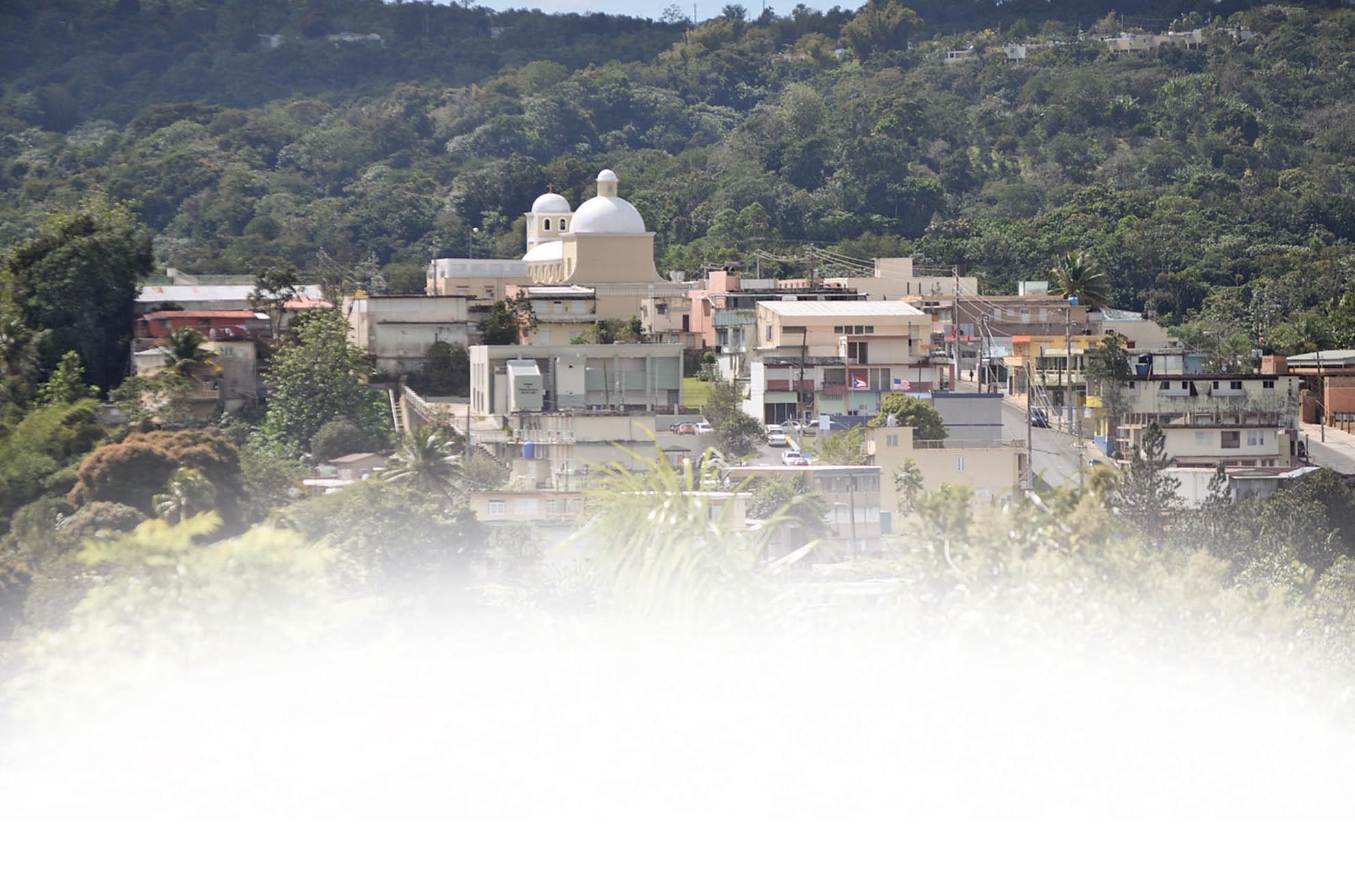
Corporate Sustainability Review 31 Caribbean Perspectives
Lares and its surroundings.
Lares, Puerto Rico
Finding Shelter
First, they had to find shelter. Seven families from the Bartolo community who lost their homes during the hurricane decided to move into a school that had been closed by the government in 2015.


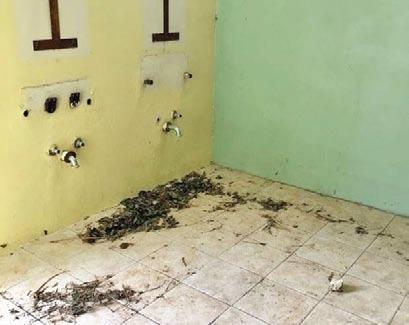

The community felt it was important and a symbolic statement to restore it and make it functional again as this had been the main school and community meeting point for the past 80 years ---some eight generations of locals had passed through its doors for educational services and to engage in common cultural activities. St. Augustin parish group joined with them and the Episcopal Church to set about converting the abandoned school building into new housing for 19 families. The title of the land will ultimately be transferred to a local church, which will sponsor the community.
Empowered through team work
Secondly, they needed to develop a means of self-management that would allow them to improve the quality of their lives. Bartolo and neighbouring communities joined forces to establish several sustainable services and self-sufficiency efforts under the Centro de Apoyo Mutuo (CAM) Jíbaro de la Montaña/ Bartolo (Mutual Support Centre Jíbaro de la Montaña/Bartolo), which was launched in October 2017 as part of a support coalition of community-based organisations. Elisa Sanchez, Jorge Irizarry, Edith Irizarry Madera, Naftali Colon, Mayra Cardona, Edith Aquino are the coordinators at the centre.
The Mutual Support Centre has a communal dining room for feeding assistance, storage and distribution of provisions, supplies of water, food and clothing. The Centre has been assisting families who have lost everything to find shelter and assist with educational, nutritional and medical needs.
Restoring power
Thirdly, Bartolo residents focused on the need for a sustainable power grid. With the help of the St. Augustin parish, the community received two solar batteries from Sonnen, and with the help of engineer Garcia from Pura Energia (Pure Energy) finally got a solar power system installed on April 7th, 2018, almost 7 months after hurricane Maria.



Ten steps towards sustainability
Next, the community had to find a way to guarantee income. Several projects have been established to cater for the needs of the people of Baratolo and surrounding communities.
Although not formally designed that way, the interventions made in Bartolo satisfy three key pillars of sustainability, namely: economic, environmental and social sustainability. The projects of the Bartolo community encompass all three aspects, and are therefore well aligned with the definition of the 1987 Brundtland Report in which sustainable development was defined as “development that meets the needs of the present without compromising the ability of future generations to meet their own needs.”
32 Corporate Sustainability Review
Photos of an abandoned school.
Sonnen battery installed with help from Pura Energia.
Installation of solar panels.
In their quest for self-sufficiency and a sustainable community, the Bartolo residents have embarked on ten projects:
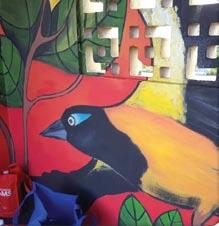
1. The Bartolo Agro Co-op Project is a cooperative micro-enterprise for the production of chickens for eggs, nurseries for ornamental plants, medicinal and herbal plants and trees for beekeeping as well as raising pigs and goats. Over the summer months, young people will be invited to CAM BARTOLO and other locations in the area to learn about animal husbandry, growing cycles, soil conservation and responsible land use.
2. The Rural Ecological School of Bartolo was launched to create sustainable economic development, and strengthen the cultural, emotional and social web of Bartolo’s rural communities; and also to promote healthy social practices for the preservation of the environment.


3. The Cooperative Institute Is designed to create small cooperative businesses for residents and to promote economic development in the rural communities. One such microenterprise is the Café that is currently being managed by young people in the community.
4. The Social Dining Room and Communal Kitchen focuses on establishing a programme that provides food for the needy and elderly who live alone. Plans are also in place to sell food to generate funds for the self-sufficiency economic programme.

5. The Temporary Social Housing Project, which is a work in progress, has resulted in the transformation of once abandoned class rooms into temporary housing apartments to safely shelter families who have lost their homes because of hurricane María.

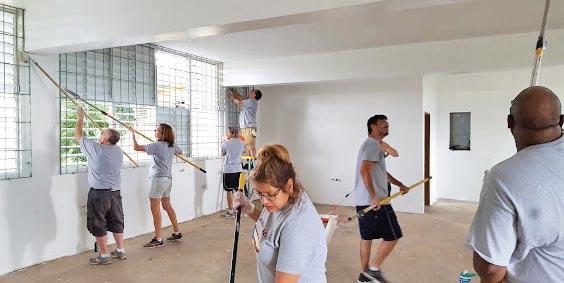


6. Bartolo Radio is a communal communications project intended to give voice to the values of agricultural workers. This resource will serve as a digital media workshop for training adults and young people in communal development.
7. The Live Theatre Café and Cinema is a cultural project which aims to enrich and foster creative activities for youth and adults through healthy entertainment. It also promotes small cooperative businesses for youth to sell edible products at reasonable prices and hold cultural events.
8. The Art School is a self-management project for the development of creative enterprises such as music, art crafts, needlework and culinary arts. The Art School’s objective is to help talented people of the community through a create-to-earn outlet which generates self-sustaining income while at the same time affirming their agricultural jíbara identity.
9. A Cooperative Agricultural School will be developed to create jobs in the community. Traditional crops will be grown and propagated. There will also be a space created for children. The Centre will take care of them while the women and men work on various projects.
10. Sport and Recreation. Lastly, various sports are also practised to bring a healthy balance to family life and encourage exercise and team work among children and youth groups.
Wendy J. Singh is a Human Rights and Human Development Specialist with over 20 years of experience reviewing laws and policies relevant to the execution of social protection programmes for the most vulnerable (children, youth, women, persons with disabilities, the elderly and prisoners), and with drafting legislation relevant to the administration of justice. She has in-depth experience in the development, assessment and implementation of social development programmes for international agencies, public and private sector, applying standards set by international treaties, and human development indicators for the MDGs. With deep knowledge and expertise within the Caribbean, she has conducted numerous financial and process audits of prisons and children’s institutions in CARICOM countries and for the UN, regional and international NGOs.
Corporate Sustainability Review 33
How it all began.
Painting.
Painting.
Communal kitchen.
Model apartments.
Art work.
Preparing the ground for planting.
B USINESS AND CSR go h AND - IN h AND at SANDALS Cricket, Coral Reefs and Caribbean People
SRI in St. Lucia has a focus on creating healthy communities in St. Lucia
Family-owned Sandals Resorts International (SRI) has transformed itself from one brand and one resort in Montego Bay, Jamaica to become one of the most well-known and award-winning hospitality companies in the world. With five brands and 24 properties in seven countries including Antigua, the Bahamas, Grenada, Barbados, Jamaica, Saint Lucia and Turks and Caicos, Sandals Resorts International is the undisputed leader of Caribbean vacation experiences and remains fiercely committed to the region, dedicating itself to innovative resort development that in the words of Chairman and Founder Gordon “Butch” Stewart, “exceed expectations” for guests, associates and the people who call the Caribbean home.

Corporate Business Strategy
Sandals has proven to be highly successful, based on their innovative marketing concepts. Sandals Resort offers an innovative concept in their all-inclusive environments, contrived to give vacationers completely worry-free accommodations. This allows guests to relax and more effectively utilize their vacation time. Sandals prides themselves for introducing the ‘couples only’ concept.
They employ guest coordinators, trained to be experts in human relations, to make guests feel at home, coordinating the guest activities and making sure that everything works the way it should. They practice TQM throughout all levels of staff.
In the ‘couples only’ market which has its origins in Sandals, they cater to different markets by offering three different levels of suites: the basic all-inclusive suites, the crystal suites that have their own private pool and the millionaire suites that are separate villas with butler service.
Sandals and its communities
by wendy Singh
What is a little less known, is that the brand and its CSR programme are intricately linked in providing guests the opportunity to experience and to contribute while staying at its resorts. Sandals Resorts International currently gives active support to more than 150 major projects in its host communities through the company’s philanthropic arm, The Sandals Foundation. This support ranges from the building of schools to the paying of teachers, to providing hospitals with linens, to bringing healthcare to the doorsteps of those who cannot afford it. The Sandals CSR strategic frame is built on three pillars:-
• Commitment to Health, Safety & Environment
• Education
• Empowering Community
Health, Safety & Environment
As a subscriber to the principles of Earth-Check benchmarking and certification programme, Sandals has its own comprehensive environmental programme, EarthGuard, which has six components: Staff Awareness, Energy Conservation Programme, Control of Hazardous Substances, Water Conservation Programme, Waste Management Programme and Social & Cultural Development.
As a participant in Earth-Check, the company’s commitment is encapsulated in its policy:-
The Sandals Group is committed to providing quality vacation experiences for our guests while we work to minimize the environmental and social impacts associated with our operations. These include, freshwater & energy conservation; recycling and reuse programmes for solid waste & wastewater; reducing or eliminating the use of hazardous substances; reduction of greenhouse gas emissions; preservation of land
34 Corporate Sustainability Review
Sandals Grande St. Lucian Spa Resort
Caribbean Perspectives
and fragile ecosystems; focused community development and cultural relations; and the employment of qualified local personnel in keeping with our existing human resource policy. The environmental focus within our hotels also includes programmes to minimize noise pollution and hazardous emissions where these are identified within our operations. CSR delivery for the chain is managed by the Sandals Foundation.
Education
When Gordon “Butch” Stewart opened his first resort, he had one very important mandate; the resort would be required to adopt a school in the community. Team members were to care for it and ensure that the facilities and students had what was needed to be successful. That was more than thirty years ago, and the beginning of a corporate commitment to community and a tradition of service that SRI has nurtured. “We have the resources, therefore the responsibility to act,” says Stewart. Today, every resort under the SRI banner is required to adopt schools and in some cases, entire communities to ensure that the messages of health, safety, environmental concern, community and opportunity are shared as much as possible. From helping to provide new computer labs and building additional classrooms to giving scholarships for academically bright but needy students and hosting career days - the resort teams continually provide mentorship and share their knowledge and resources with the Sandals’ Caribbean neighbours.
In 2007, Sandals Resorts earned the Condé Nast Traveler World Savers Award for the Adopt-A-School programme and the work in the Caribbean communities where Sandals Resorts operate.
Empowering Community
SRI believes in working with the community and for the community to tackle complex issues such as violence, poverty, disaffected youth, lack of health care access and employment training. Together with civic leaders and neighbors, we’ve created programmes directed at areas that will have the most sustainable and positive impact. While our community programmes are wide in scope, they all share the common goals of giving people a chance to change lives. Programmes supported by the Sandals Foundation include skills training with certification, mentorship, animal shelters and toy drives.
Sandals sponsors West Indies Cricket
This year, the luxury hotel chain Sandals Resorts is the new major commercial sponsor of West Indies cricket. Sandals Resorts has replaced Digicel, the Irish telecommunications giant, who closed its sponsorship, which was due to end in 2020, ending a 13-year commercial relationship.
According to Caribbean Life news, in a partnership recently announced, the Caribbean resorts hotel brand will sponsor all West Indies representative teams from Under-15s, through the senior men and women’s squads. Sandals will also serve as kit sponsors and will also have major stadium branding and broadcast sponsorship.
Cricket West Indies (CWI) Johnny Grave has hailed Sandals’ sponsorship, noting that both Sandals and CWI share such a prestigious international brand that is synonymous with promoting the best of the Caribbean to the world.
He said Sandals Resorts’ investment will not only help fuel the game at all levels within the Caribbean but will enable CWI to achieve its strategic objectives.
Sandals were sponsors for the Hurricane Relief Twenty20 at Lord’s, England which saw West Indies face an ICC World 1, to raise funds to rebuild stadia in the Caribbean that were damaged after the passage of Hurricanes Irma and Maria last September. The two-year deal with Sandals will end in December 2020.
Sandals moves to protect coral reefs
For Sandals in the region, the conservation of coral reefs is important for multiple reasons aside from being credited for contributing to the most diverse ecosystems on the planet. Amongst their varied purposes coral reefs protect coastlines from the damaging effects of waves and tropical storms as well as function as a means of shelter for marine organisms. The fishing industry which is of great economic value to countries such as Jamaica depends on coral reefs. According to a Catlin scientific survey the Caribbean has lost 80% of its coral coverage in recent years. If there is progressive incline in the depletion of coral coverage this could lead to the eventual disappearance of our beaches and collapse of the fishing industry.
The Sandals Foundation in partnership with Coral Restoration Foundation and CARIBSAVE planted over 500 pieces of coral. These corals were produced from a nursery built within the Boscobel Marine Sanctuary on the north coast by the three organisations in November 2015. The out planting in surrounding areas to assist with the resilience of the reefs followed a nine month cycle that involved the production of the coral.
Jonathan Hernould, Environment Officer at Sandals Foundation emphasised that, “An integral part of the establishing of the nurseries is to allow visitors to the Caribbean an opportunity to get involved in coral conservation activities. Their involvement raises awareness on its importance that
Corporate Sustainability Review 35
would contribute to the sustainability of our initiatives. We are excited to see the growing trend of visitors’ interest in marine conservation and look forward to partnering with guests on our future out plants. We have ensured that we planted elkhorn and staghorn corals which are two fast growing corals that should allow us to do annual out planting.”
Protection of the environment both above and below sea level is one of the pillars that Sandals Foundation is built on. Through partnerships the Foundation is committed to bringing public awareness to the harmful effects of environmental negligence whilst promoting proactive methods that individuals and organizations may pursue.
Sandals in St. Lucia
In St. Lucia, the team’s CSR activities are built on its governing principles. The HS&E programmes on conservation and efficiency are hallmarks of Sandal’s St. Lucia operations. But here the chain focuses heavily on education and youth development – not only in host communities but across the island. There is a concerted effort to address hot-spot communities and families marginalised by income and geography.
Some of the year-round projects undertaken by the Sandals team, local partners and guest volunteers include:
Empowering Community through Sports
• The Sport Youth Camps in football and cricket. Through the Trevor Daniel Academy, SRI, within the last five years, has sponsored over 300 underprivileged kids, providing coaching, uniforms, equipment, transport and meals during sessions.
• The under-15 Cricket Academy which is delivered in partnership with the West Indies Cricket Board (WIBC), is a 7-day intensive, residential programme which is hosted by SRI where participants are housed at the resort and provide meals, transport and professional coaching. Coaching is not restricted to sporting excellence but includes a number of other components such as life-skills, managing change and fame, and management. The programme is fully funded by SRI.
• Other sporting sponsorships are directed at community groups and cover football, tennis and basketball in inner city communities
Empowering Community through Education
The focus of the St. Lucia team is in depressed communities. SRI aims to leverage education as a catalyst for change and they do so in a number of ways. SRI encourages reading in
primary schools through the weekly Reading Road Trip whereby both hotel guests and staff volunteer to distribute books and read to children. SRI also provides alternatives to traditional education through hospitality training for high schoolers and young adults in partnership with the Sir Arthur Lewis Community College and the Munroe College. Some 1000 persons have been trained over the past six years through this residential 6-week training programme, many of them securing employment with Sandals across the Caribbean or at other regional hotels. In addition, along the value chain, SRI provides career advancement for persons already working within the industry through the Sandals Corporate University (SCU) which is affiliated with the American Hospitality Institute. There are over 200 accreditation programmes offered by the SCU. The training is all certified and widely recognised and accepted internationally.
Through the Butch Stewart trademark Adopt-A-School programme, staff volunteers give time and talent to schools in at-risk communities – providing food, entertainment and gifts at Christmas and other seasonal occasions.
In partnership with the Salvation Army, SRI supports a community school in Castries for single mothers and the annual Christmas Dinner for the mothers and Salvation Army staff. This initiative which is intended to ease the financial and personal demands on young mothers is directed at preprimary children from infancy to five years old.
Under its education thrust, SRI is a major contributor to the Tourism Enhancement Fund which is managed by the local Tourism and Hotel Association to develop and improve the quality of service on the industry. SRI is an 80% contributor to the programme.
Health & Safety and the Environment
SRI works with the Great Shape Foundation in Jamaica which deploys dentists to provide check-ups and treatment at mobile clinics in depressed communities. In partnership with regional carrier LIAT, SRI provides air transport, meals and accommodation to volunteer dental practitioners. In 2016 dentists treated over 900 persons during the 2-week outreach. SRI also ships equipment in and sets up mobile clinics at various schools throughout the island.
SRI St. Lucia also engages in a national annual Coastal Clean Up Campaign with the Caribbean Public Health Agency (CARPHA); a means of reducing waste that makes it to the sea shores, SRI shipped 10,000 reusable bags into St. Lucia last year which staff distributed at local supermarkets and community market places.
36 Corporate Sustainability Review
JOBS ARE NOT ENOUGh
At the time of writing, 175 murders had been committed in Trinidad and Tobago in the first four months of 2018. This represents a 45% increase on the same period just five years ago. In fact, of the last 64 months, a mere 11 (17%) have averaged less than a murder a day. Only one of these months of relative calm has come since the end of 2015 1 .
Over this same period, only 2014-2015 saw an annual reduction in murders. Perhaps that year offenders took Kerwin Du Bois and Ravi B literally when they sang ‘Overdoing It’. Either way, the respite was short-lived.
Meanwhile, the government and the Trinidad and Tobago Police Service (TTPS) say they are doing their best to remedy the situation. It is beyond the scope of this article to judge their progress or make policy recommendations. Instead the following paragraphs focus on the role of business and interventions it can make, for its own good and for the good of the country.

Crime as a symptom
Before discussing potential private sector crime interventions, it is important to understand that many forms of crime are believed to be symptoms of prevailing socio-economic conditions and culture. In 2017, Professor David Canter – an internationally renowned applied social researcher and crime psychologist – stated, “The central message that emerges from all these studies is that criminality is an integral part of how society, and its culture, is constructed. Thinking of crime as generated by abnormal individuals that is the responsibility of law enforcement and the judicial system is to ignore the
endemic processes that sustain it and those who deal with it on a daily basis 2”.
The last sentence is worth repeating, “. . . Thinking of crime as generated by abnormal individuals that is the responsibility of law enforcement and the judicial system is to ignore the endemic processes that sustain it and those who deal with it on a daily basis”.
Compare this with the view of many in our society. For example, in early 2018 a prominent economist opined publicly that the private sector has no role to play in solving the issue of crime, and that it is purely a public-sector responsibility.
Where focus is needed
So, if many forms of criminality are symptoms, what are some of the contributing socio-economic and cultural factors? Poverty will naturally come to mind for many, though research suggests that phenomena such as economic inequality, inequality of opportunities and a lack of social mobility are more important than the mere presence of poverty. Thus, efforts focused on simply reducing poverty may not have significant impact on the crime situation.
This hints towards a role for the private sector. By their very nature, businesses aim to generate ever-increasing wealth, which may help reduce poverty. But more importantly, business can directly affect economic inequality, inequality of opportunity and a lack of social mobility through its operating policies and practices as well as through CSR initiatives.
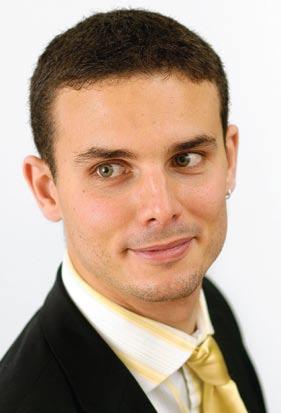
Opportunities aplenty
Before discussing some of the ways companies can play a role, it is important to acknowledge that work is already being done. The pages of this and past CSR editions are filled with
Corporate Sustainability Review 37
1 Trinidad and Tobago Police Service, Totals Crime by Month Report. Accessed on 25 May 2018http://www.ttps.gov.tt/Statistics/Crime-Totals-By-Month
2 Professor David Canter. 2017. To Know a Society, Know its Crime. Accessed on 25 May 2018 https://www.socialsciencespace.com/2017/09/know-culture-know-crime/
Opinion
The private sector’s role in creating a safer society
View of Port of Spain, Trinidad from the cruise port
kyle Santos
by kyle Santos
companies that have committed time, effort and money to help solve social challenges in Trinidad and Tobago. However, more can be done and existing initiatives can be improved or scaled to increase their impact.
Below are some examples of actions companies can take to help the country’s crime situation.
• Entrepreneurship and employability training programmes – These sorts of programmes are quite common, both locally and internationally. Usually a company will sponsor or co-deliver a programme in collaboration with an NGO, CSO, other business or government body. The programme may provide beneficiaries with some combination of employability skills, life skills, entrepreneurship skills, literacy and financial literacy training, technical training and even mentorship. Projects that encourage the five C’s of positive youth development (Connection, Confidence, Character, Caring and Competence) are often the most effective in reducing negative behaviour. Or, according to Pittman et al. (2003) “Effective youth engagement is not just about fixing behaviour problems. It’s about building and nurturing all the beliefs, behaviours, knowledge, attributes and skills that result in a healthy and productive adolescence and adulthood” 3
• Internships and apprenticeships – Many companies already offer internships and apprenticeships, however only a handful of these will proactively target at-risk youth or youth in conflict with the law. It is understandable that companies may be wary of such initiatives, but there are numerous examples around the world of companies that have successfully embraced such programmes. Since 2011 Brigade Bistro in London UK, has run training programmes for homeless and at-risk individuals, which culminate in six-month apprenticeships in the restaurant’s kitchen. In Italy, InGalera restaurant is located inside of a jail and open to the public. The restaurant is staffed by prisoners who are given the opportunity to learn new skills and develop their work ethic. Back in the UK, large chains such as Greggs (a bakery), Boots (a pharmacy) and Timpson (a retailer specialising in shoe repair, key cutting and engraving) have dedicated schemes for hiring ex-offenders. As Trinidadian prison consultant Dr. Summer Alston-Smith explains, “these involve
thorough recruitment processes and work placement trials based on ‘Release on Temporary License’, whereby prisoners leave jail during the day to work and return in the evening. The guarantee of employment provides stability to prisoners upon release, while employers gain extremely loyal staff!”
• Be an equal opportunity employer – In addition to meeting all legal requirements, employment practices should embrace diversity, ensuring the only thing that matters is finding the best person for the job, irrespective of race, gender, age, sexual orientation, family situation or social class. This may require those with responsibilities for recruitment to undergo some level of unconscious bias training. Hiring processes may also be designed so that all applicants receive the same treatment and ensure any special needs applicants have those needs met. This fair and equal treatment should continue throughout each employee’s time with their company, giving everyone a fair chance to learn, develop and progress in the business.
• Reduce white collar crime and corruption – The causal link between corruption, economic inequality and poverty have been well known for some time. Research by the International Monetary Fund (IMF) in 1998 found this link to hold across countries with different growth experiences, different stages of development and even using various indices of corruption. Respondents to primary research conducted by the author in 2017, also identified white collar crime and corruption as the third most important socio-economic challenge facing Trinidad and Tobago, just behind violent crime and weak public institutions. Corruption cannot exist without willing private sector participants.
Regardless of the approach taken, it is clear the private sector has a role to play in helping solve the problem of crime in Trinidad and Tobago. It is also clear that companies are best able to do so by targeting the socio-economic and cultural causes of crime, rather than crime itself.
The current situation is unsustainable. The Inter-American Development Bank (IDB) ranks Trinidad and Tobago sixth out of 17 Latin American and Caribbean countries for annual costs of crime as a proportion of GDP. It estimates our economy loses between 2.26% and 3.52% of GDP to crime annually. In the current economic climate, those are losses we simply cannot afford.
http://kylesantosconsulting.com/│+1-868-327-2359
38 Corporate Sustainability Review
3 Project Everlast. http://dhhs.ne.gov/publichealth/MCAH/Documents/HYN2015-FiveCs_YouthDevelopment.pdf
Kyle Santos is Managing Director at Kyle Santos Consulting and Chairman - Responsible Business Committee at Trinidad and Tobago Chamber of Industry and Commerce. He has spent over 10 years helping businesses to understand their social and environmental relevance and create shared value. Prior to establishing Kyle Santos Consulting, he has and he spent eight years working with some of the UK’s leading companies as part of PwC UK’s world renowned sustainability & climate change advisory team and as a Senior Manager in the PwC network’s Global Corporate Responsibility team. Kyle Santos can be reached at” ksantos@ kylesantosconsulting.com│
FOSTERING YOUTh ENTERPRISE
Why we should do it and how
by Saarah khan
The world’s youth, aged 15-29, accounts for nearly a quarter of the total global population, and yet youth unemployment is remarkably high, both in developed and undeveloped countries alike, where youths are twice as likely to be jobless, when compared to adults.1
Youth enterprise offers a market-driven approach to achieve social and economic development, by simply finding an innovative way to deliver new products and services. This results in a decreased dependency on archaic systems and technologies and a reduction in poverty by providing an avenue for employment and occupational activity amongst youth. At the same time, contributing significantly to sustainable economic growth, enhanced competitiveness and productivity through the development of new markets and business models.
Young people are historically a force for driving sustainable change, economically, socially and environmentally. Entrepreneurs can tap into new and niche opportunities, which can inspire related businesses and sectors that support the venture, thereby stimulating economic growth. These ventures also generate new wealth streams and the development of new markets, resulting in increased


1. http://thecommonwealth.org/media/news/state-worlds-youth-population-new-indexunderscores-urgent-need-invest-young
employment and higher earnings contributing to national income, further stimulating the economy.
Many entrepreneurs often support ventures by other likeminded individuals and invest in the development of their communities, as the qualities that motivate them to become an entrepreneur are the same ones that motivate them to “pay it forward”.2 We have seen the push locally from young entrepreneurs to place more emphasis on the impacts of businesses, with initiatives such as IAMovement, which promotes events and activities that raise awareness for positive social, environmental and economic issues and offers a space for discussion.
In any economy, entrepreneurship is an essential multiplier, as a single idea can create a number of jobs and revenue for a country. However, the idea alone cannot result in the best outcome as it needs support and care to reach maximum potential. While more than 40% of youth prefer self-employment and believe it to be feasible3, few are able to sufficiently sustain themselves in this career path. This is due to the significant barriers faced by young entrepreneurs, especially for those in rural environments. The most common of these are a lack of education and training programmes specifically geared to entrepreneurial skills, lack of financial resources and access to funding, limited business networks and market barriers.
The role of the government and policymakers is vital in fostering an entrepreneurial ecosystem. This can be
2 https://www.investopedia.com/financial-edge/0310/millionaires-who-gave-it-all-away.aspx
3 https://www.oecd.org/cfe/leed/SummaryReportSeminarYouthEntrepreneurshipRev.pdf
Corporate Sustainability Review 39
Opinion
Saarah khan
accomplished through a variety of policies and programmes focusing on modifying regulations to combat any unwanted social outcomes, such as loss of career choices, unfair market practice, and income inequality. Governments can also support youth enterprise by easing business environment constraints, promoting value chain integration and strengthening capacity to improve business practices.
Access to financial support is also a key factor in the success of any enterprise, and more so for a youth driven enterprise as this group often has the least access to ready capital. Many governments and institutions around the world have created developmental programmes that offer grants and funding options specifically tailored to the needs of participating youths. Another option is to provide young entrepreneurs with financial advice and access to potential angel investors, venture capital or the facilitation of debt financing options through training programmes and workshops.
The non-financial support may be even more important in terms of supplying a knowledge base for new entrepreneurs to develop the business, technical and life skills necessary to excel. This can be achieved through partnering with educational institutions and organisations, establishing incubators to support innovation and business startups, offering training and mentorship opportunities through conferences, workshops, competitions and other activities, as well as developing a support network of young entrepreneurs.
A great example would be the annual Emerge Conference run by The Skoll Centre for Social Entrepreneurship, which is a social impact centre within Saïd Business School at the University of Oxford. Programmes like these provide an outlet for students, young professionals, entrepreneurs and organisations from across the globe to interact with others, who have an interest in driving transformational sustainable change, to discuss and experience a diverse range of topics and ideas for socially impactful entrepreneurial outcomes. These types of events are also a unique opportunity to network, build skills, and interact with experts and peers, and can be incredibly important as a resource for young entrepreneurs to hone their skills and learn from a community of innovators and potential mentors.
Locally there are organisations like Youth Business Trinidad & Tobago (YBTT), which provide support to young entrepreneurs in the form of funding, mentorship, learning and development opportunities and support programmes, with the support of the business community.
Ultimately, entrepreneurship is a powerful tool to combat youth unemployment and to jump-start the economy. There is a real value in fostering the rise of youth enterprise as it can have a positive impact on the economy, society and the environment, allowing for true sustainable growth.
The Skoll Centre for Social Entrepreneurship at University of Oxford’s Saïd Business School is a leading academic entity for the advancement of social entrepreneurship worldwide. We foster innovative social transformation through world-class education, cutting-edge research, and collaboration among business, policy, academic, and social leaders. The Skoll Venture Awards provide funding to current Oxford Saïd students and alumni who have developed a social impact-focused venture. The business model should be based on a deep knowledge and understanding of the problem it seeks to address. The Skoll Venture Awards are for those who apply an ecosystem-focused approach to addressing social and environmental challenges.

The Awards serve to supply the venture with catalytic funding, but the Skoll Centre also accompanies these social businesses as they progress in their development, including identifying possibilities for further financial and non-financial support. Winning the award opens up a whole host of opportunities for the team, helping to drive the venture forward. 2018 winner Boresha Technologies was awarded the winning prize of £20,000. Acknowledging that small farmers need liquidity to operate their businesses, Boresha aims to provide reliable and low-cost sources of working capital for them, by managing invoicing and supply chain finance on their behalf. They also ensure that lending processes are clear by using a hybrid of digital ledgers, voice messaging, and paper pay stubs and work to facilitate investment in rural supply chains, connecting agribusiness owners with capital for investing in storage, transport and other assets.
Saarah Khan is a graduate of Cranfield University, United Kingdom. (MSc Management & Corporate Sustainability), and a member of the Chartered Management Institute, United Kingdom (CMI Level 7 Dip Strategic Management and Leadership (QCF). You can email Saarah to work with corporate inhouse sustainability teams at: saarah.khan812@gmail.com
40 Corporate Sustainability Review
Th E E MPLOYMENT
A LTERNATIVE Youth Entrepreneurs and the Rise of the Gig Economy

Brianna West writing in Forbes Magazine refers to us as “permalancers” meaning that we are not quite free lancers but we are also not employed full time. Still others refer to our profession as the “gig economy.” Call it what you may, this is entrepreneurial activity. We are entrepreneurs. As work and occupations evolve people like me will be lecturers, consultants, traders on the stock market and business owners – all at the same time. Let’s face it, there is the belief that millennials were “dealt a bad hand” since the great economic depression.
Governmental organisations such as the United Nations (UN) and various governments around the world have cited the lowest unemployment rates since the Great Recession particularly for young people. For this reason, among many of the young people especially those born to baby boomers, there is the realization that the definition of a job has to change, ushering the rise of youth entrepreneurship. To this effect, nearly all of the job and employment expansion being felt currently across various economies can be accounted for through alternative careers. Young people are increasingly getting involved in different alternative careers other than what can be considered as 9-5 jobs. The gig economy, Small Office/Home Office (SOHO) businesses as well as freelancing are becoming the new norm in employment solutions for youth.
Reimagining what a job or a career is and how it is defined is leading to a new wave of small-scale entrepreneurship and business growth with promising new opportunities. This largely explains the emergence of the “gig economy.” A gig economy is an environment where people work in temporary positions as organisations and employers move towards more short-term and flexible contracts.
by Jaysen Francis
Over the years, the trend of white-collar full-time employment is getting redefined with more and more millennials opting for contract employment instead of looking for permanent jobs. Low levels of available jobs have greatly contributed to the influx of young job seekers and entrepreneurs in the gig economy. In line with this observation, we can conclude that the trend towards the gig economy has begun and is creating a remarkable change in the creation of employment for youth. According to a study by Intuit, a US-based business and software financial company, about 40 percent of young American workers will be independent contractors and freelancers by 2020. While there is no available data for Trinidad and Tobago, our high propensity to consume western culture may place us in the same ranking. This reflects the shifting business and cultural business environment especially the perception by young people of what it means to be employed.
There are some factors that have largely contributed to the rise of this way of working in the digital age. Worldwide, the workforce is becoming increasingly mobile with the use of digital gadgets such as phones and computers. This means work can be done from anywhere, a factor which largely decouples work from the location. With the advancement of technology, increasing numbers of people are able to work remotely, from the comfort of home and even across borders; and this flexibility is fueling a rise in this type of work. Due to the digitization of payment transactions, it is also becoming easier for individuals to work from the comfort of their homes and receive payment directly to their mobile phones. It is also easier to transact business through mobile phone money transfers, another factor that has contributed to the rise of the gig economy.
Entrepreneurship is the best answer to youth unemployment. Currently, there are more than 358 million young people around the world that are unemployed and not undergoing any training, according to the United Nations. This is more than the populations of USA and Canada combined, which shows the seriousness of the unemployment

Corporate Sustainability Review 41
Opinion
Jaysen Francis
problem. Entrepreneurship plays a crucial role in providing opportunities and job creation in solving the seemingly intractable problem of youth unemployment. An annual Job Creation Survey carried out by the World Economic Forum this year shows that hiring plans by entrepreneurs outpace most of the employers in the job market including governments. The survey indicates that in 2015, 47% of entrepreneurs across the world have plans to expand their workforce compared to large corporations which had plans to expand their workforce by a paltry 29%. This means that entrepreneurs and entrepreneurship have the potential to greatly impact on employment rates.
Entrepreneurship has proved to be a good alternative to employment. Young people are increasingly embracing the idea of starting and running their businesses rather than looking for formal employment. The self-employment ambitions are particularly strong in developing markets, like ours, especially in countries that have embraced empowerment for young people such as China. Governments and youth empowerment organisations should provide young people with a conducive environment and financial support to help them to establish their businesses. Governments can also provide incentives such as reduced taxes to young entrepreneurs to help them establish their businesses with ease.
Technology is evolving and advancing almost by the day with numerous developments affecting entrepreneurship. For instance, in the field of Information Technology, fundamental changes have cropped up in recent years. One such change is the emergence of the Internet. The Internet provided a whole new level and platform for advertising and sourcing of ideas for entrepreneurs. Today, a considerable percentage of customers purchase commodities online through the Internet. This poses a great deal changer in entrepreneurship where businesses are forced to advertise online as well as operate online selling of their products to keep up with the competition. This scenario showcases the deep and strong role of technology in modern day entrepreneurship. Today, entrepreneurs have to cope with technology to stay afloat in their areas and keep up with competition, failure of which will result in the collapse of their businesses. As it is said “innovate or die.”
Two examples come to mind - Matthew Charles Mullenweg who developed WordPress at the age of 19 years while a freshman at the University of Houston, now has a net worth of 40 million. WordPress is one of if not the most popular blogging platform worldwide. Definitely, Matt
Mullenweg is a successful youth entrepreneur. Another is David Karp a web developer and youth entrepreneur. According to Forbes, Tumblr, a popuar microblogging and social networking website, is currently valued at $800 million, and Karp’s net worth is more than $200 million. Before developing Tumblr, Karp was working as a Software consultant. Tumblr emphasises customisation to its users and ease of use, features that have made it quite popular among many people worldwide. In Trinidad and Tobago stronger structures are needed to facilitate the development of youth entrepreneurship.
On a whole, governments and non-governmental organisations worldwide have the responsibility to formulate and implement policies and practices that are vital in encouraging and developing youth entrepreneurship. However simple and repetitive this may sound, it will require extensive cooperation and political will to achieve. Nongovernmental organisations also need strong dedication on their part, if this feat is to be achieved. All policymakers involved in developing policies and enforcing practices to oversee better and increased youth entrepreneurship should introduce training on entrepreneurship in training institutions to help youth gain entrepreneurial skills. They should also increase funding to entrepreneurial studies to support entrepreneurial curriculum and professional development and to evaluate programme results. It is also necessary for governments to adopt global standards for youth entrepreneurial education.
After providing the necessary entrepreneurial education to youth to enable them to establish their businesses, it is also vital to provide mentorship and guidance to young entrepreneurs to help them to establish their goals and objectives in their businesses. This ensures that young people do not get lost through lack of vision for their businesses and subsequent failure of their businesses. It is also necessary that the governments and concerned organisations provide funding regarding loans to the young entrepreneurs to help them to establish their businesses. Provision of incentives such as reduced taxes and allocation of building spaces for small businesses of young entrepreneurs also comes in handy in helping young entrepreneurs to establish their businesses. It also would be a major boost to young entrepreneurs if governments provided free and strong internet connection which is a major ingredient in today’s businesses. All this must be taken into account if, as a country, we are seriously thinking about diversifying the economy. In the next issue, I propose to look at entrepreneurship and diversification.
42 Corporate Sustainability Review
Jaysen Francis, is a lecturer and CEO of Shufffran Business Consulting, holds a B.Sc. Business Administration from New Brunswick in Canada and an MBA from the Lord Ashcroft Business School, Anglia Ruskin University.
TOO FEW FEMALE ENTREPRENEURS & INVESTORS
How women entrepreneurs in the US overcome the challenges
by Paula Fernandes
Entrepreneurship was once considered a man’s domain, but the tide has shifted: More than 9 million U.S. firms are now owned by women, employing nearly 8 million people and generating $1.5 trillion in sales, according to 2015 data from the US organisation, the National Association of Women Business Owners.
“While the numbers are growing, there are still too few female investors and start-up entrepreneurs, which can make it more challenging to raise capital and find mentors,” said Megan Smyth, CEO and co-founder of FitReserve. “Network and you will discover that there are plenty of women and men who are eager to advocate for and mentor female entrepreneurs.”
Although more women are embracing entrepreneurship, they often face challenges not typically shared by their male counterparts. To shed light on some of these disparities, female CEOs spoke with Business News Daily about the key challenges women entrepreneurs face and how to overcome them.
1. Defying social expectations
Most female business owners who have attended networking events can relate to this scenario: You walk into a crowded seminar and can count the number of women there on one hand. When women entrepreneurs talk business with primarily male executives, it can be unnerving.
In this sort of situation, women may feel as though they need to adopt a stereotypically “male” attitude toward business: competitive, aggressive and sometimes overly harsh. But successful female CEOs believe that remaining true to yourself and finding your own voice are the keys to rising above preconceived expectations.

“Be yourself, and have confidence in who you are,” said Hilary Genga, founder and CEO of women’s swimwear company Trunkettes. “You made it to where you are through hard work
and perseverance, but most importantly, you’re there. Don’t conform yourself to a man’s idea of what a leader should look like.”
Some women also may worry about coming off as too aggressive. But Alexandra Pierson, founder and CEO of social media app springpop, urged fellow female entrepreneurs not to be concerned about this. Pierson noted that, during early negotiations for app development deals, she often was afraid to be firm and clearly state what she believed to be fair.
“I eventually learned that, woman or not, my business would fail if I refused to defend or fight for it,” Pierson said. “Since then, I no longer worry about being seen as aggressive.”
2. Limited access to funding
Not all startup founders look for investors to help get their businesses off the ground, but those who do know how difficult the pitching process can be. Raising capital is even more difficult for women-owned firms: A 2014 Babson College report found that less than 3 percent of venturecapital-funded companies had female CEOs.
Bonnie Crater, president and CEO of sales and marketing analytics company Full Circle Insights, said venture capitalists tend to invest in startups run by people of their own “tribe” — for instance, a Stanford-educated investor will want to back a Stanford alum’s business. This means that VC firms with female partners are more likely to invest in women-run startups. But according to the Babson report, that accounts for only 6 percent of U.S. firms. Women looking for business investors should build confidence through a great team and business plan, Crater advised.
Investors typically look for businesses that can grow their valuation to over $1 billion, Crater said. “Think about how to do that,” she advised. “If you have experts on your founding team that can execute the business [operations] well, investors
Corporate Sustainability Review 43
Opinion
will have confidence in those people. [You also] need a good product market fit.”
Another way to overcome this issue is by working to get more female investors involved in supporting one another, said Felena Hanson, founder of Hera Fund, a female angel investor group. According to Hanson, groups like hers are “looking to not only inspire and encourage female investors, but to grow and support other female entrepreneurs through both funding and strategic educational workshops.”
3. Playing with the boys
Most would consider any given field to be male-dominated. It’s even more of a challenge when you’re coming in as a female having to give direction to males that may not want any direction. Alison Gutterman, CEO and president of Jelmar, learned just that early in her career.
“As a female entrepreneur in a male-dominated industry, earning respect has been a struggle,” she said. Early in her career at Jelmar, she was managing men in their 40s when she was only 25. “They were more experienced than I and often dismissed my new ideas about marketing and sales, and some assumed I didn’t have the drive to put in the long hours and hard work they did.”
She notes she’s heard it all: from being dismissed as just the boss’ daughter to presumptions that she was living off her father’s and grandfather’s reputation, as they were the previous owners.
“I was more than willing to put in the work to create my own reputation for being a hardworking, honorable businessperson in my own right,” Gutterman said. “To overcome this, I have had to learn to build my confidence and overcome my negative selftalk, or as I like to call it, ‘head trash.’”
Gutterman defines “head trash” as all the negative comments from yourself, likely stemming from others, you have let build up in your head.
“They’re stopping you from reaching your full potential. One of the best things I’ve done to help me in this area is join a variety of women entrepreneur groups,” she said. “These groups have provided me mentors and peers to inspire me, hit me with reality checks on my capabilities and successes and help me grow and learn from their outside perspectives and experiences.”
4. Owning your accomplishments
The communal, consensus-building qualities encouraged in young girls can leave women unintentionally downplaying
their own worth. Molly MacDonald, founder and CEO of The Mobile Locker Co., a startup that provides personal storage for events, said she has always found it difficult to convey her own worth as a leader.
“When I talk about the company … I always find myself saying ‘we’ instead of ‘I,’” MacDonald said. “I know I have fallen into this pattern for two reasons: Using the first person to discuss successes feels to me as if I’m bragging, and I cannot shake the idea that if someone knows it’s just me in control, the value of what we do will go down. As I grow the business, I am making an effort to own what I’ve accomplished.”
Similarly, Shilonda Downing, founder of Virtual Work Team, advised women to recognize the value of their creative ideas.
“I’ve had to catch myself on occasion when I noticed that I’m giving away too much without a financial commitment from a potential client,” Downing said. “[I] recommend other women value their knowledge as well.”
Sharon Rowlands, CEO of digital marketing firm ReachLocal, agreed that confidence is the key to success, even when you’re up against a boardroom full of men. Rowlands noted that when she was a newly appointed CEO, she often felt her ideas received more scrutiny than those from her male colleagues. However, she didn’t let that discourage her from being a great business leader.
“I had confidence in my abilities to run the business,” Rowlands told Business News Daily. “I just made sure that any initiative I was trying to move forward was backed up by a solid business case. I was never unprepared for the questions that I knew would come. I [also] think many women naturally have extraordinary common sense, a sharp intuitive sense and a great focus on people. These are extremely valuable in business and can help to set us apart as leaders.”
5. Building a support network
Forty-eight percent of female founders report that a lack of available advisers and mentors limits their professional growth, according to Inc.
“With the majority of the high-level business world still being dominated by men, it can be hard to blaze your own path and facilitate the introductions and connections into some of the more elite business networks,” said Hanson, who established the Hera Hub co-working space to foster support and collaboration among female entrepreneurs. “As most of business today still rings true with the philosophy that ‘It’s not what you know; it’s who you know,’ this can be a huge factor in your ultimate success.”
44 Corporate Sustainability Review
Knowing where to find the right support network isn’t always easy. A few good places to start include womenfocused networking events — such as Womancon, Women in Technology Summit and WIN Conferences— as well as online forums and groups created specifically for women in business, such as Ellevate Network.
6. Balancing business and family life

Work-life balance is a goal of many entrepreneurs regardless of their gender, but mothers who start businesses have to simultaneously run their families and their companies. And in this area, traditional gender expectations often still prevail.
“Being a mother while running a business is very challenging,” Genga said. “There are ways to balance your time, but the perception is that you could be more effective running your business if you didn’t have to deal with kids.”
Genga said she has learned not to take shortcomings on either front too seriously, and to not beat herself up over the little things, such as missing a class trip with her children.
“Mompreneurs” have dual responsibilities to their businesses and to their families, and finding ways to devote time to both
is key to truly achieving that elusive work-life balance, she said.
7. Coping with a fear of failure
According to Babson College’s 2012 Global Entrepreneur Monitor, the fear of failure is the top concern of women who launch startups. Failure is a very real possibility in any business venture, but Delia Passi, CEO of WomenCertified and founder of the Women’s Choice Award, said it shouldn’t be viewed as a negative.
“You need to have massive failure to have massive success,” Passi said. “You may need 100 ‘nos’ to get one ‘yes,’ but that one ‘yes’ will make you more successful tomorrow than you were today.”
Pierson offered similar advice for female entrepreneurs, encouraging them to work through the moments of selfdoubt that every business owner faces.
“I have stopped worrying if people will treat me differently in business because of my gender … and have stopped comparing myself to others, including men,” she said. “The bottom line is, if you’re successful, no one cares whether you are man or a woman.”
Corporate Sustainability Review 45
This article is reproduced from Business News Daily. Paula Fernandes is a New Jersey-based writer with a Bachelor’s degree in English and a Master’s degree in Education. She spent nearly a decade working in education, primarily as the director of a college’s service-learning and community outreach centre. Her prior experience includes stints in corporate communications, publishing, and public relations for non-profits.
T RANSITIONING TO A B LUE E CONOMY
Our island states in the International Year of the Reef
by dr. anjani Ganase
Why CSR should extend to marine conservation and climate change. Marine biologist and coral reef ecologist, Dr Anjani Ganase, argues the case for CSR of the Ocean.
Iconic branching Elkhorn corals used to dominate and build Caribbean reefscapes for thousands of years until the 1980s when disease resulted in a regional collapse. Although global warming and local degradation continue to threaten these corals, marine protection and management have assisted in some recovery. This photo was taken in the Buck Island Reef National Park in the US Virgin Islands.
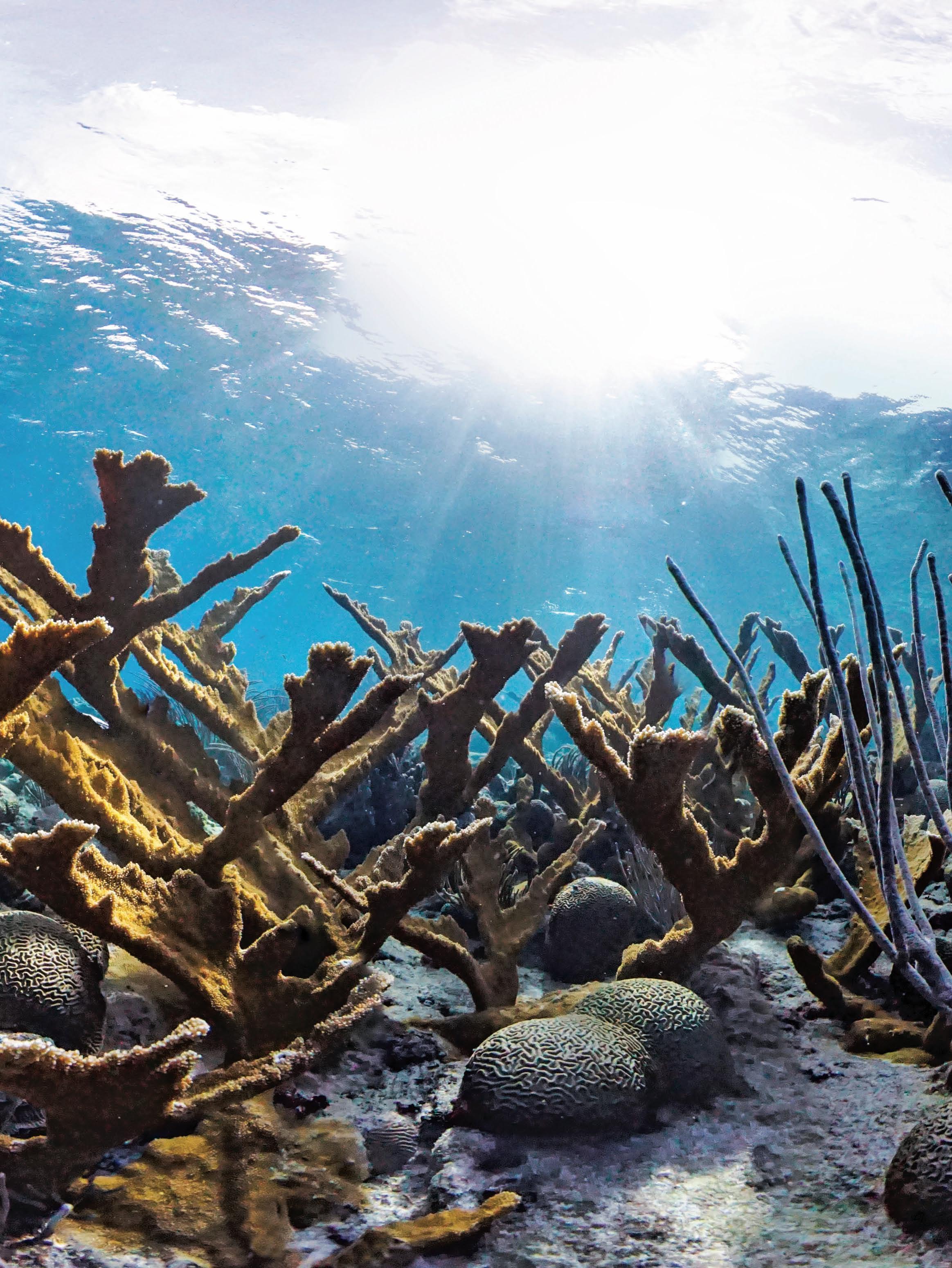
Feature Story
Photo credit: The Ocean Agency, Year of the Reef Image Bank.
46 Corporate Sustainability Review
The science is out, and it is agreed that humans are altering the global climate because of industrial carbon emissions. The current and predicted impacts on smallisland developing states and our natural ecosystems, which are also important economic assets, are devastating. One such asset is our coral reefs. This crucial ecosystem is fundamental to our lives and livelihoods. Although they make up less than 1 % of the ocean, they provide habitat for up to 25 % of ALL marine life at some point in their lifecycles. But coral reefs do much more: shallow reef communities provide shoreline stability and protect coastlines and coastal communities from storm surge; they are a major source of economic income for Caribbean islands. In 2006, it was estimated that Tobago received about 101 –130 million USD from direct and indirect coral reef associated tourism and fisheries (40 % of tourists visited the island for coral reef related activity). Additionally, the estimated annual value of natural shoreline protection provided by coral reefs is about 18 – 33 million USD, especially in the low lying southwest of Tobago, where the majority of the population lives and which is most vulnerable to coastal erosion and storm damage.
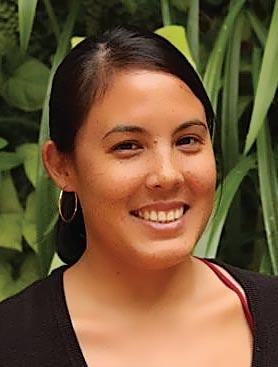
Corals are amazing animals. In the warm shallow waters of the tropics, where the water is clear enough and temperature is suitable, corals have developed a crucial symbiosis with algae. The algae make their home in the tissue of the coral; and in return provides the coral with food from photosynthesis. The sustenance provided by the algae allows corals to build incredible underwater reef cities, as the corals grow laying down calcium carbonate skeletons. Unfortunately, global warming has triggered a rise in coral bleaching events, where excessive warm temperatures break down the symbiotic relationship between the coral and the algae. When the algae leave the coral tissue, the coral loses its pigmentation, hence the bleaching effect. Eventually the coral, starved of its food supply, dies. This loss results in devastating consequences to the marine life that depends on these corals. Recovery of coral reefs after such disturbances is slow, taking over ten years to recover, and only if no other disturbances occur. 2018 was declared the 3rd International Year of the Reef, by the International Coral Reef Initiative, as a result of the longest and most severe global bleaching event yet, 2014 to 2016. Extreme summer temperatures killed corals and devastated reefs worldwide and was a severe blow to many communities
and nations reliant on these ecosystems to sustain their economies.
Fortunately, the reefs of Trinidad and Tobago were largely spared in the last bleaching event, but we are certainly not out of the woods, as bleaching events are predicted to become more frequent and more severe. Trinidad and Tobago has a long history of poor management or neglect of our marine environment, and there is still a lack of necessary plans and enforcement to protect these natural assets. Our coral reefs and connected marine and coastal ecosystems (mangroves and seagrass areas) are impacted by waste and plastic pollution and habitat destruction; they are smothered by erosion and soil washed into the sea through unregulated land clearing activities. In addition, there is no management of fishing practices, as well as overfishing of species (lobster and conch) important to the ecology of the reef.
The responsibility for the health of our reefs can no longer rest solely in the hands of government and conservation units, especially as we are all culprits of climate change. To secure the future of our coral reefs and dependent marine communities, to safeguard our ocean assets, we need crosssector collaboration and compromise. Objectives such as reducing carbon emissions, minimising waste production as well as cleaning up the results of decades of ignorance require individual commitment but collective actions. The first step is being aware of all activities that affect fragile ecosystems, no matter how far away they seem to be.
Why should the private sector care?
All businesses – accommodation, restaurants, retail, import or export, recreational, manufacturing or mining – in Trinidad and Tobago need to assess their long-term and indirect impacts on marine ecosystems. Choices from the site selection of the business or service (hotel or a golf course), transportation, to specifics like the purchasing (for instance choosing ecologically important fish species in the restaurant), and decisions about waste disposal or recycling send messages to consumers and regulators about how we value our ecosystems. At larger scales, investment in alternative energy sources may reduce our carbon footprint even as it reduces dependence on unsustainable and finite energy reserves especially in Tobago or in rural areas. Initiatives such as this do not go unnoticed in the global market and will attract regional and global interest and partnerships, the more innovative the action the better.
We also need to invest in continuing education programmes and innovative technology; green solutions and tools to make the transition to a green (or blue) economy easier.
Corporate Sustainability Review 47
anjani Ganase
Look for tools, such as algorithms that detect inefficiencies in your workflow and production line; seek out technologies and materials that are eco-friendly and honestly sourced. Processes are being up-dated regularly and rapidly, and it serves our environmental purpose to be constantly upgrading to less harmful or destructive practices. Finally, we need to invest in our employees and clients; consider community and social partnerships to ensure the sustainable extraction and use of our marine environments.
It is necessary to think about our future in regard to climate change. The reality is that the overall average temperature of the world is getting warmer: droughts will impact crops as well as natural forests; sea level is rising and we can expect more coastal erosion and flooding; hurricanes may be fewer in number but much more intense; the oceans are absorbing more heat and coral reefs and marine organisms will suffer. Disaster management plans must be developed and implemented by both public and private sectors, and these must consider vulnerable communities, such as coastal fishing communities that rely on coral reefs and are subject to
coastal erosion. Plans need to consider the recovery timelines of the ecosystems (the assets) that the communities rely on, which can take ten years or more to recover.
By transforming the relationship with the marine environment (or any ecosystem for that matter) from being mainly extractive, to actively advocating “wise use” (conservation and protection) we can diversify the job opportunities needed to support a larger economic framework and limit the stress on coral reefs. As an example, consider birding ecotourism or research and development tourism instead of the exclusive all-inclusive resort. These would be small first steps to reducing the devastating impacts of climate change, while assisting in poverty alleviation, inclusion of marginalised groups and securing sustainable lifestyles. Coral reefs, as biodiversity hubs, offer examples of symbiotic co-operatives; intrinsically, they are sources of untapped value such as for medicines that are important for the treatment of cancers and viruses. Engineering solutions for the marine environment and efficient aquaculture practices are all emerging from research on marine organisms and ecosystems.

48 Corporate Sustainability Review
Typical Caribbean coral reef.
Photo credit: The Ocean Agency/ XL Catlin Seaview Survey
We now know that the vast ocean is not endless, and humans can fill it up with garbage and can deplete and destroy its largesse. But it is not too late to begin to change. There are still unexplored areas of deep ocean; and organisms and relationships about which we are yet to learn. We also now know how much more there is to know about the Earth and Ocean, as a climate regulating system, our global ecosystem. It is wise to begin to care for what’s near – our own islands, coral reefs and marine territories – and extend such caring to all relationships, all ecosystems.
Anjani Ganase is a Doctor of Philosophy (PhD) focused in Coral Reef Ecosystems from the Global Change Institute, The University of Queensland. An experienced Marine Biologist actively engaged in the research industry, a specialist in coral reef research and spatial ecology, she is well-known for her popular blog ‘Wild Tobago’. Anjani is skilled in scientific diving, statistical analysis and scientific communication. Connect with Anjani on LinkedIn at https://www.linkedin. com/in/anjani-ganase-48897275/
Unlike Pacific coral reefs, typical Caribbean coral reefs are less colourful, consisting of different shades of browns. Nevertheless, Caribbean coral communities create massive and unique underwater structures, providing surfaces and spaces that can be utilised by other marine life.

Photo credit:

Corporate Sustainability Review 49
The Ocean Agency/ XL Catlin Seaview Survey
BRAND ACTIVISM - The Relevance of Brand Activism to CSR in a Caribbean Context
 by Monique Mata
by Monique Mata
In the era of public outcries, protests and petitions, brands have been forced to make some unusual steps towards staying relevant to the ever-changing world of the modern consumer.
Though the practice of Brand Activism and bringing awareness through brands has been a part of the international CSR practice for some time, it has been gaining increasing momentum across island states. It is not uncommon for brands to focus on those aspects of human life or the environment that their brand is most likely to negatively affect, as is the case with many oil companies adopting social projects associated with maritime conservation. It becomes more powerful though, when brands pursue projects that give a voice to a societal issue that is of concern and interest to most citizens. Dissecting how brands go about choosing one cause over another requires a considerable amount of work with large amounts of data, but it is a step in the right direction having brands understand the “me-to-we” continuum and that what affects one of us, affects us all.
Over the past two years, we have seen some brands – with varying degrees of success – engage the nation on a societal issue, to better relate to the communities and groups in which they operate and to demonstrate true corporate citizenship. According to the Meaningful Brands report published by Havas, over 75% of citizens expect that brands

will do more than just make a product or service available or provide good customer service. Consumers want to know that brands care about and are working towards their overall wellbeing and that they add something of value to society. Earlier this year, a well known supermarket chain began campaigning to reduce the impact of plastic bags on the environment by reducing consumption and mandating reusable bags at its stores. The chain received mixed reviews from the public, but in just three short months its consumers adopted the changes and the use of plastic bags has been almost completely wiped out at eighteen stores nationwide.
It is becoming ever more vital that brands are encouraged to put people at the centre of their strategy instead of placing a heavy focus on isolated messages or tactical actions. The ground has shifted to a demand for brands to consider the wider relationship they have with their consumers and by extension, with society. Brands with activist stance have outperformed their competition by a staggering 206% over a ten year period from 2006 to 2016 (Havas 2018). Not only is there growth for profit margins, but there is a 71% correlation between content effectiveness and the impact a brand has on social wellbeing. To put it simply, content moves consumers who are inspired by the work that a brand is doing outside of selling.
Daily we are overloaded with copious amounts of media and a staggering amount of content which means that the message of most brands either gets lost or quickly fade from memory. A brand message that has no impact, has no value to the consumer or to the organisation. 84% of people expect brands to provide content that tells a good story, provides
50 Corporate Sustainability Review Feature Story
Monique Mata
solutions and creates experiences and events. So how exactly do brands go about adopting a nation-wide cause in this age of computational propaganda and fake agendas? Make no mistake, it takes a great deal of work to define the values of an organisation and to start introducing them into the business model, but the core objective is to integrate societal factors where they intersect with corporate mission to equal shared value.
Some useful tools that can help kickstart the process include Social Tracking which requires taking a deep-dive analysis into the community in which a company has developed or is currently headquartered, with common agreement on what needs to change, what policy goals they share and how brands can create shared economic, social and environmental value.

Open innovation or co-created change can also help establish commonality across different brand audiences by defining the intrinsic values brands share with consumers and build out the brand’s activity around these values with people
at the centre. The final tool is ground-up business models centred on the people (including employees) which generate disruptive strategies that respond to the demands of modern society, creating value and transparency. For example, a company’s product might be bath and body, but its cause can easily be a fight against domestic violence and a drive to reduce the number of women-related deaths as a result of domestic violence, through education and awareness. This should also be supported and demonstrated by leadership, who can offer perspectives and statements in various public forums to reinforce those values across a wider constituency.
Companies that have championed a myriad of causes have found that taking a stand for something meaningful to society, genuinely improves the bottom line. Corporate responsibility is in a rising tide of new trends and progressivism in societal truths. Activism tells a good brand story and it makes a brand feel more relatable, because there is little more authentic than the expression of human to human empathy.
Corporate Sustainability Review 51
F OOTPRINTS IN T h E SAND : Personal responsibility in dealing with the phenomena of coastal debris

Trinidad and Tobago is blessed with a diversity of landforms such as rolling hills, expansive flood plains, mountains and rocky cliffs. However, one of the most popular physical features that we regularly enjoy is our sandy beaches. Beaches are formed from a build-up of loose sediments, usually sand or silt along a body of water. Sediments can settle from crashing waves, gusts of wind and streams of water. Sandy beaches are great tourist attractions, offering spaces for business, social events and personal leisure. They are important areas of recreation. However, during recreational usage, people may leave behind more than their footprints, sometimes unintentionally. At a beach lime, patrons may bring single use plastic plates, spoons, forks, toys, containers and bags. Improper disposal of these items or leaving them behind contributes to coastal debris pollution. Coastal debris can also transition towards marine debris if these items are taken by the sea.
The Popular Coastal Debris
One of the largest contributors to coastal debris is also one of the most widely used materials in the 21st century –plastic. Plastic was created just around 100 years ago. It is strong, light, cheap and highly accessible which makes it a wonder material of our age. However, these traits that make plastics a wonder material also make it a wonder pollutant. It seems to last forever but it breaks down fastest in sandy beach environments as most plastics would degrade when exposed to sunlight and wave attack against rough sand grains.
by Ryan Seemungal
Plastic can breakdown from centimetres to micrometres and even to nanometres. To show just how small a nanometre can be, a strand of hair is around 80,000 to 100,000 nanometres. This makes it especially difficult to remove from sand as it can be blown, buried, eaten and even transported to a whole new environment if left to the mercies of the coast. In the not too distant future, geologists will be able to see the 21st century in rock marked by pieces of plastic in the sediment layers of the earth.
Few creatures can eat plastic and break it down into more natural, useful materials. Seabirds, turtles and whales mistakenly eat plastic which can lead to discomfort and even death. Debris also causes entanglement which can also lead to death. Tiny pieces of plastic can get trapped in the gut where they remain causing discomfort or introducing harmful chemicals like persistent organic pollutants into living tissue. It is partly for these reasons the number and density of marine life in the world’s oceans have declined. In some parts of the ocean, it’s more likely for a fisherman to get a haul of debris instead of fish. By the year 2050, The New Plastics Economy report has suggested that if all present conditions stay the same, there will be more plastic pieces in the ocean than there are fish in the sea. That’s not good news for the fisherman who relies on his catch to earn a living.
52 Corporate Sustainability Review Feature Story
There are ways YOU can help to combat coastal and marine debris:
1. Reduce, Reuse, Refuse and Recycle
Avoid one-time use of plastic items when possible when its use is optional. Refuse the use of plastic bags or straws if at all possible.
2. Avoid products with microbeads if possible
Microbeads are a form of micro plastics, which have been banned in the United States. They can be found in acne treatments, toothpastes and shampoos which make them hard to avoid.
3. Take part in a beach or river clean-up activity

The International Coastal Clean-up has removed over 20,000 debris items from Trinidad and Tobago’s shores alone through volunteers!
4. Buy bulk
Instead of buying 5 -500ml drinks. You can buy one 2 litre drink, save money and refill a drinking bottle. Larger plastic items are more likely to be removed by people from the environment and disposed of properly.
5. Use ‘Green’ plastic
Less is more when dealing with a problem based on consumption patterns. “Green” plastics are made using petroleum and plant based substitutes to create a plastic product. This means that it took less fossil fuels and greenhouse gases to make the plastic material.
6. Use less and discard biodegradable plastics properly
Biodegradable plastics are generally catered for landfills and are not rated to be marine biodegradable unless explicitly stated. Marine biodegradable plastics exist but are still too expensive to be used in mass production.
7. Adopt paper and more natural products
Businesses can try to adopt paper-based or more natural products to conduct operations and deliver services on a daily basis. The humble doubles man has been using paper due to its low cost and light weight when providing you with a meal. An added benefit is the paper, which he uses can be recycled and is biodegradable. In some communities in India, edible spoons have been introduced and have been well received.
8. Carry garbage bags with you. D O NOT LITTER.
9. Teach and encourage others to use reusable products
Reusable products help curb litter in the environment and it can be more cost effective to do so.
Curbing Coastal and Marine Pollution
The Institute of Marine Affairs (IMA), primarily an advisory body to the Government of Trinidad and Tobago, has been involved in many activities that will help curb pollution of our coastal and marine environments. The IMA is the Regional Activity Centre (RAC) for the Cartagena Convention – an agreement ratified by 25 other member states in the region meant to tackle land based sources of pollution which includes “floating” garbage. The IMA has also supported the International Coastal Clean-up Campaign which is run annually (usually September) by Ocean Conservancy, an international non-profit organisation, dedicated to marine and coastal management. The IMA is also instrumental in developing the Integrated Coastal Zone Management (ICZM) Policy for Trinidad and Tobago. The Draft ICZM Policy 2014 has 11 main objectives all relating to the use, management and protection of coastal resources sustainably. Objective 10 specifically caters to promoting and enhancing pollution controls and waste management activities towards having as little negative impact on both human and coastal ecosystems and their ability to support beneficial human uses. The draft policy can be found online.
Combatting marine and coastal debris is an international problem. However, we can reduce our footprints in little ways that will lead to a big impact. A cleaner sandy shore means more fun, more business and more pride for us. Sandy beaches are not just for us to enjoy now, but shared amongst the living animals that really just leave footprints and eggshells in the sand.
Corporate Sustainability Review 53
This article is reproduced from the IMA. Ryan Seemungal is a Geospatial Technician with the Institute of Marine Affairs
T h E PLASTIC BAG DEBATE Caribbean and international perspectives on bans on plastic and styrofoam
In July of this year, the Trinidad & Tobago government approved a ban on styrofoam products which will take effect in 2019, but which will see an almost immediate ban on the importation of styrofoam products into the country.
(The Guardian, July 28th, 2018).
The announcement was made by Planning and Development Minister Camille Robinson-Regis during a conference at one of the country’s popular eco-destinations, the Caroni Bird Sanctuary, following approval by Cabinet two weeks prior.
Robinson-Regis has assured local polystyrene manufacturers that they will be given time to make their products environmentally-friendly, and to provide them financial protection in the transition. She said a team has been set up “that is working with the current producers of styrofoam so that they will not be totally out of pocket.”
Policy change needed for T&T
Government has also been encouraging citizens to begin recycling other waste such as polyethylene terephthalate (PET) plastic bottles, drink cartons, aluminium cans and glass bottles. Polystyrene foam products are already being phased out in Tobago after the THA passed a motion to do so in 2017.
A policy change needs to be effected to support government’s call for change. According to THA official Linford Beckles, while there are currently “no taxes on styrofoam products coming into Trinidad and Tobago,” there are taxes on “environmentally friendly alternatives,” which he said did not “align with environmental ideals.”

By January 2019, Dominica, home to 70,000 people, plans to fully ban all common plastic and styrofoam single-use food containers. The decision builds on an earlier initiative to restrict imports of non-biodegradable containers, an attempt to cut off their flow into the stores and restaurants that distribute them.
Climate-change resilience for Dominica
According to National Geographic writer, Sarah Gibbens, “Dominica plans to become the world’s first climate resilient nation, and banning single-use containers is one step they’re taking to get there.” She says, “In the coming years, the country wants to become the world’s first climate resilient nation. In addition to protecting its valuable tourism industry, the government hopes sustainable policies will make the island more resilient to hurricanes like the one that devastated the island’s infrastructure in 2017.”
A 2016 IMF study identifies Dominica as one of five Caribbean territories most at risk for impacts of climate change. The study names Belize, Dominica, Grenada, Saint Lucia and St. Vincent and the Grenadines at the “extreme level of vulnerability” to natural disasters. For the Dominica government it is a race against time as the country works to make the island climate-change resilient.
In a publication of November 2017 entitled, ‘Unleashing Growth and Strengthening Resilience in the Caribbean’ which reviewed the principal economic and financial challenges facing our region and attempts to suggest policy prescriptions, it was posited that reducing disaster damage by one-half, could lead to significant growth gains
54 Corporate Sustainability Review Feature Story
for Dominica. This in turn “could help to break the negative debt-growth cycle and improve debt dynamics.” Studies show that for every dollar spent on disaster risk reduction, anywhere between five and ten dollars are saved in disaster response. This is the rationale on which the Dominica government is basing its policies and programs, prudent spending and investment that protect our future.
Plastic bans are a windfall for supermarkets
Gary Mortimer Associate Professor at Queensland University of Technology in Australia, sees the elimination of plastic bags as a windfall for supermarkets but it won’t do much for the environment.
Moves by major supermarkets to stop providing free plastic bags could earn these businesses more than A$1 million a year, but may only have a small impact on the environment.
Australia’s two supermarket giants, Woolworths and Coles, have announced that their stores will stop offering their regular plastic bags within 12 months. Instead, customers will be able to buy a more durable plastic bag at 15 cents apiece, or simply bring their own.

These bags are factored into the cost of doing business for these supermarkets. There are costs beyond just the bags themselves, such as the costs associated with sourcing and negotiating with packaging suppliers, procuring them, shipping and warehousing them, and distributing them to stores only to then give them away.
Supermarket margins are already feeling the strain of price deflation. These businesses are generally making less than 6c on the dollar, so the opportunity to phase out this cost certainly makes good business sense. The table below provides an estimate of current costs.
Estimated costs for Australian business
While retailers stand to pocket this saving, the switch to stronger, multi-use plastic bag brings with it its own costs. To begin with, the bags alone cost more (9c each) and also have
associated procurement costs. However, the new scheme will immediately reduce customers’ bag usage. Being optimistic, it would be reasonable to see an 80% decline in plastic bag use as shoppers actively search for alternatives to free bags.
Most shoppers will probably reuse the 15c bag, or look to other options like canvas bags, polyethylene bags or cardboard boxes. In turn, while the new re-usable bag may cost more than the thinner single-use bag, fewer will be used and therefore ordered. Retailers can expect to see a reduction in these packaging costs.
It’s estimated that Australian retailers give away 6 billion plastic bags each year. Woolworths alone say they provide 3.2 billion each year. Coles has not provided an estimate of bag use, but claim to process 21 million transactions each week. With fewer stores than Woolworths, I estimate that Coles may give away up to 2.7 billion bags annually.
With each bag costing almost 3c, retailers stand to save more than A$170 million a year in direct costs. Selling these new bags at 15c each effectively creates another revenue stream potentially adding up to A$71 million in gross profit (6c x 1.18 billion units).
Vacillating in the US and the UK
In 2013, Target reverted to providing free plastic bags after three years of charging 10c per bag. Other than hardware retailer Bunnings, no other large retailer has initiated a voluntary ban on single-use plastic bags.

In Australia, the past impact of applying a charge to the use of plastic bags has provided positive, but mixed results. In Australia, Bunnings reported an 80% reduction after implementing a charge for plastic bags, while a 2008 trial undertaken in three Victorian regional towns by Coles, Woolworths and IGA resulted in a 79% reduction.
In 2002, Ireland applied a 15 pence (22c) charge to single-use plastic bags, claiming a 90% reduction within 6 months (this was before the transition to the euro currency in the same
Corporate Sustainability Review 55
year). Then in 2007 it increased the charge to 22 euro cents (32c) in response to increased bag usage. Sadly, shoppers had become conditioned to the 15p charge and returned to their old habits.
The UK government likewise reported an 85% reduction in single-use plastic bags in the first 6 months after a 5p charge (8c) was implemented in 2015. Similar results have been reported in the US, with a 94% reduction in Los Angeles County from the introduction of a charge for bags.

In the above cases (excluding Australian examples), singleuse bags were still available, however a levy was applied, creating revenue for governments to channel back into environmental programs. This model is not the planned approach for Australia, where all single-use bags will be replaced with either the heavy duty (>35 micron, LDPE) option at 15c or the “green” polyethylene bag.
Charges for bags should go to environmental programs
Unfortunately, introducing a charge for bags doesn’t help the environment in isolation. While plastic bags represent only about 2% of landfill, there is certainly sufficient scientific evidence that plastic bags do present risks to marine life and clog waterways.
However, simply charging for a plastic bag, without directing these funds into environmental programs, does
not necessarily resolve the problem. Shoppers slowly return to old habits, governments and retailers stop educating consumers and re-usable bags soon make their way into water ways and landfill.
Some shoppers simply forget to bring re-usable bags with them. The UK Department for Environment, Food and Rural Affairs found that the average UK household had 40 plastic bags stashed away around the home. Also a South Australian parliamentary review found that only about 30% of shoppers actually recycled their re-usable bags.
In the US, studies indicated 40% of shoppers continued to use disposable bags, despite a 5 cent levy.
Moving to a reusable option also doesn’t stop people discarding these new bags either. Another US study found many people still threw away reusable bags.
Ultimately, “banning the bag” is only the beginning. Retailers will need to remedy customer complaints as the phasing out of plastic bags begins.
Like UK retailers, Australian supermarkets could choose to funnel some of the profits derived from the 15c reusable bag into community programs or environmental groups. Australian governments will also need to fund ongoing education campaigns to draw attention to bans, alternatives and outcomes.
56 Corporate Sustainability Review
This article draws from articles by The Conversation – “Getting rid of plastic bags: a windfall for supermarkets but it won’t do much for the environment” (July 2017), National Geographic – This Island Nation Is Banning Plastic (August 2018), and “From Survival, To Sustainability and Success: A Resilient Dominica” (The National Budget of The Commonwealth of Dominica Fiscal Year 2018 – 2019.)
The Climate and Sustainable Development Network (CSDevNet), an NGO, has called on the Federal Government to ban the production and utilisation of single-use plastics in Nigeria.

WAVE AFTER WAVE of GARBAGE h ITS the D OMINICAN R EPUBLIC
Come for the beaches, say tourism ads for the Dominican Republic. But it has some beaches you might want to skip right now.
The Caribbean nation is known for sapphire seas and ivory beaches, but it is grappling with waves of garbage washing up on its shores, a vivid reminder of the presence of thousands of tons of plastic in the world’s oceans.
Those piles, most notably the “Great Pacific Garbage Patch,” are usually far from human settlements, to say nothing of resort destinations. But instead of visitors relaxing on Montesinos Beach in the capital, Santo Domingo, there has been an altogether different scene, one unlikely to wind up on a postcard: Hundreds of city workers and volunteers who have been waging an uphill battle against wave after wave of sludgy garbage.
Images have shown teams using pikes, shovels and excavators to lift the garbage, only to be met with new waves carrying even more. Sixty tons of garbage have been collected on the beach since mid-July Reuters reported. The haul included plastic bottles and styrofoam takeout boxes, Parley
by Palko karasz
for the Oceans, an organization that works to reduce plastic waste in the world’s oceans, said in a statement.
The images are shocking, but perhaps not for people who live in the Dominican Republic. “It happens pretty much all the time if there is a strong rainfall or a storm,” said Cyrill Gutsch, the founder of Parley for the Oceans, in a telephone interview.
The phenomenon is not confined to the Dominican Republic, he said, and can be seen in many developing nations with a coastline. “Everybody uses the rivers and the beaches as dump sites.”

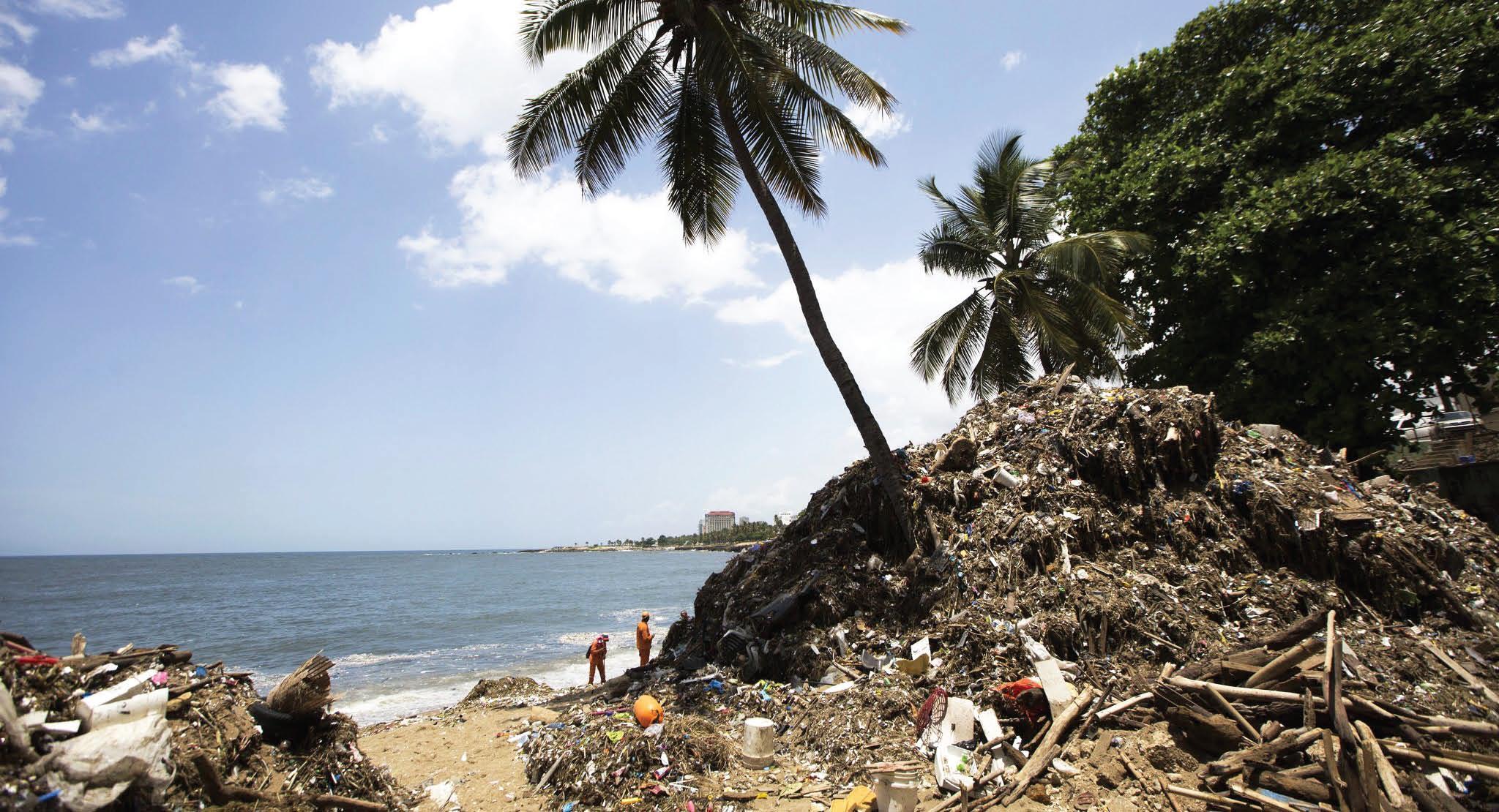
58 Corporate Sustainability Review
Feature Story
The plastic waste comes from the Ozama River, which flows into the Caribbean near the beach. Credit, Orlando Barria/EPA, via Shutterstock
What is happening in the Dominican Republic is only a small symptom of the larger global problem, Mr. Gutsch said. Plastic dumped in and near rivers washes into the ocean, and only a small percentage bounces back onto shore. The majority makes it to the high seas.
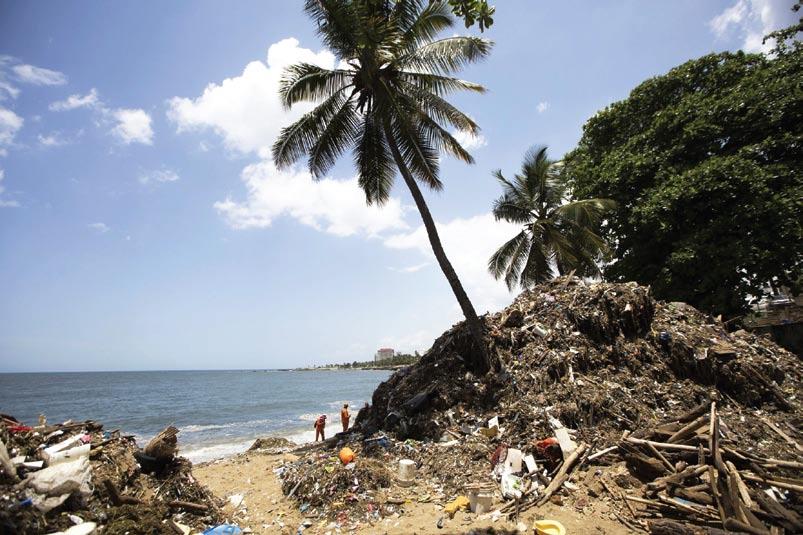
Mr. Gutsch said that recycling was a short-term solution and amounted to only a bandage. Parley for the Oceans advocates phasing out single-use plastic altogether. The plastic waste washing onto Montesinos Beach comes from the Ozama River, which flows into the Caribbean Sea nearby, one of those in charge of the cleanup, Gen. Rafael Antonio Carrasco, told Reuters.
“What you don’t see in the picture is all the toxic stuff,” Mr. Gutsch said, adding that once it is out in the open, plastic breaks down and releases chemicals that are impossible to capture.
Wildlife trapped in the debris and humans affected by the toxic particles in the waves are all at risk, local environmentalists said.
Hundreds of city workers and volunteers have been waging an uphill battle against wave after wave of sludgy garbage. Credit,
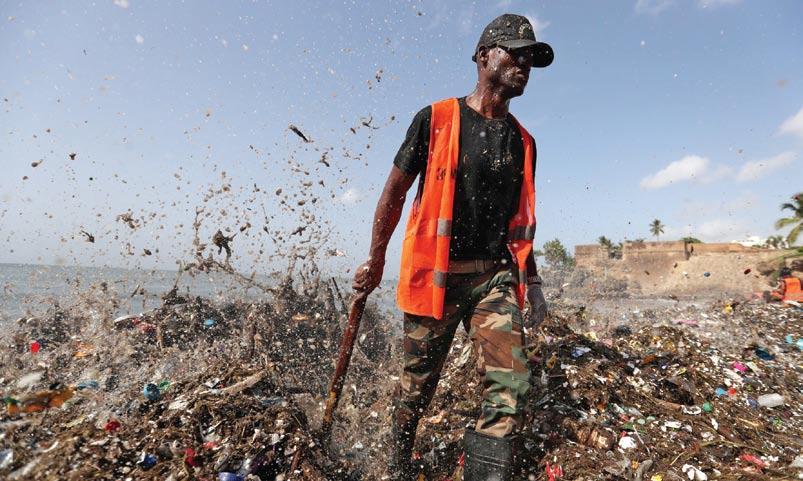
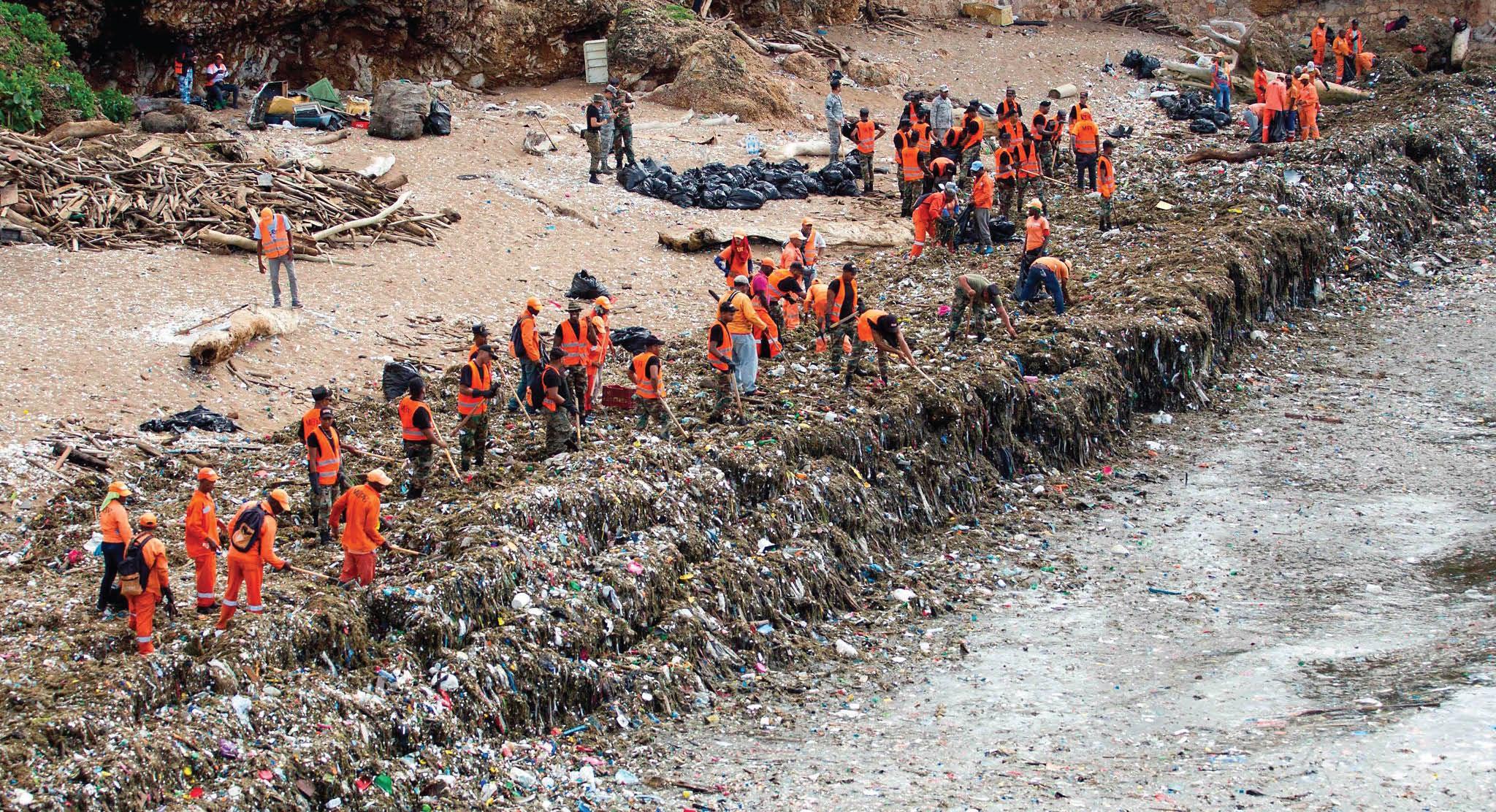
Corporate Sustainability Review 59
Workers collecting garbage from a beach in Santo Domingo, the capital of the Dominican Republic, July 2018. Credit, Erika Santelices/Agence France-Presse — Getty Images
Sixty tons of garbage have been collected on the beach in one week. Credit, Orlando Barria/EPA, via Shutterstock
Ricardo Rojas/Reuters
This article reproduced from the New York Times of July 2018. The writer Palko Karasz, is a digital editor for The New York Times, based in the London newsroom and part of a digital team that covers live news. He is also a digital storyteller who focusses much of his work on Central and Eastern Europe.
BRINGING CSR TO T h E h OMEFRONT
submitted by the Cadv
CADV President Roberta Clarke promotes collaboration for zero tolerance on domestic violence.
In a time when crime and criminality are at the forefront of citizens’ minds, the issue of women’s security remains a top priority for the Coalition Against Domestic Violence. Did you know that during the period 2010-2015 131 women were murdered as a result of domestic violence? This works out to be an average of 25 domestic violence killings per year. In 2017, 52 women were killed, 43 of them were labeled as a tragic end to domestic issues. By the end of the third quarter of 2018, 15 women have met their deaths due to domestic violence.

We at VYTT continue to encourage corporate involvement in the phenomena of personal crimes against women and children. Human rights specialist and writer Wendy Singh has written extensively in various forums on the increase of child sex abuse in the Caribbean and we are witnessing a spike in the nature and frequency of violent crimes against women in Guyana and Trinidad and Tobago. More recently VYTT and partner SXD Leadership have introduced a new module #We-Need-To-Talk in its Communicating for Influence (CFI) corporate training programme, to address workplace bullying as an extension of domestic and culturally entrenched behaviours. VYTT supports the Coalition Against Domestic Violence (CADV) and its new President, Roberta Clarke and how she is engaging with business and society to build awareness and change the culture of violence.
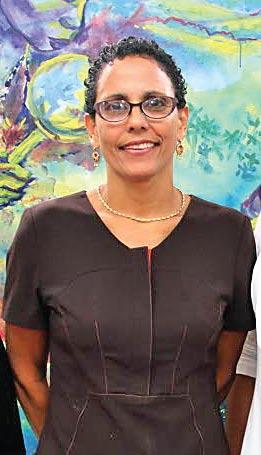
The Coalition Against Domestic Violence is a non-profit company with charitable status which has worked assiduously since 1988 to develop critical interventions for those experiencing domestic violence. Although its early work focused on crucial support for victims, over time the organization has broadened its scope to include shelters, children’s homes, individuals and groups working to end all forms of abuse.
A recent study done by the Inter-American Development Bank (IDB) in 2017 confirmed that one in every three women in Trinidad and Tobago has experienced physical, sexual and psychological abuse by their intimate partners. The study estimates that approximately 11,000 women are still likely to be in abusive relationships. Further, UN Women research done by the Institute for Gender and Development Studies, St. Augustine found that the critical support systems such as the police, courts, health services and other social services were woefully inadequate and unresponsive to victims’ needs.
The Coalition recognises that its principal mandate is to bring sustained attention to the scourge of domestic violence. It utilizes a multi-sectoral approach to ensure that the efforts
60 Corporate Sustainability Review Feature Story
of all stakeholders are harnessed under one umbrella to deliver the best responses possible. Whist the Coalition provides essential counselling services for victims and survivors, its work with other responders such as the police service and healthcare sector remains a priority to ensure better protection, safety and care. To this end, the Coalition collaborates with the Trinidad and Tobago Police Service to integrate effective domestic violence responses into its training curriculum for new recruits. The Coalition is also collaborating with the healthcare sector to provide training for nurses so that they can better respond in situations involving domestic violence incidents.
Further, the Coalition understands the significant value of pursuing a preventative agenda. Violence against women may be triggered by several factors such as substance abuse or poverty related issues but it is essentially rooted in and caused by unequal power relations between men and women. Violence is used to exert power and control and is used as the ultimate weapon to control women. Gendered socialisation results in the creation of different roles for men and women in which male privilege is embedded and perpetuated by institutions.
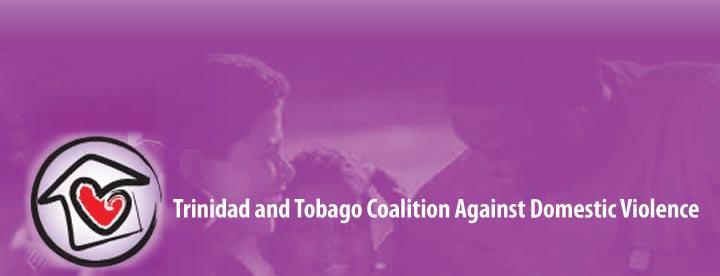
The adage that ‘domestic violence’ is a women’s issue must therefore be rejected. The Coalition’s President, Roberta Clarke, advocates that “We must work together to change our culture to one of zero tolerance for violence.” Interventions are required from all stakeholders who have key roles whether they are legislative, judicial, corporate, social or cultural. Although significant progress has been made in the development of the law relating to domestic violence, policing protocols and police training, the implementation and enforcement of these laws and policies pose a serious challenge.
Shelters offer temporary accommodation to victims. However, shelters do not accommodate male children over the age of twelve years. Shelters must budget between $90,000$150,000 annually for operational expenditure. Most are finding it difficult to survive and at least one has been forced to shut its doors. Consequently, a concerted effort must be made to plug all loopholes that deny women’s access to both justice and essential services. Women are demanding safety and security in their homes and they are entitled to it.
In the past, the Coalition led several initiatives such as the development of the children’s hotline called Childline and pioneered a school-based prevention programme entitled Peace, Love and Understanding in Schools. Going forward, the Coalition is working on intensifying its prevention programming at the community level and expanding its counselling services. In this regard, the Coalition intends to partner with the police service towards improving the implementation of the Domestic Violence Act and developing an accompaniment programme whereby volunteers accompany victims when they attend court or access social services. In addition, an early intervention programme for perpetrators by the Coalition and an education project for primary school students to promote zero tolerance for all forms of violence are in the developmental stages.
On November 10, 2018, the Coalition will launch its sixteen days of activism which will culminate on the International Day Against Domestic Violence, November 25th. The Coalition makes a call for action. Wherever you are and whoever you are, your response and your support will make a difference. Join the cause! Be part of the action to stop violence in our families and in our communities.
Corporate Sustainability Review 61
The Board Members of the Coalition are Roberta Clarke (President), Roslyn Ali, Diana Mahabir-Wyatt, Asha Wilson, Carolyn Fifi and Euon Rivers. Please reach out to anyone of them or the General Manager, Sabrina Mowlah-Baksh at 624-0402/627-6844/627/4795. You can also email us as cadvtt@gmail.com or visit our Facebook page. The office is located at 1 Robinsonville, Belmont.
K
ANSMACKER
R ECYCLING
Can the private sector save us from our garbage?
by Robert Clarke
“People keep saying we’re on the right track, but we’re running out of oxygen,” admits Kansmacker Recycling’s Director of Operations.
Aaron Yono – heir to a proprietary, technology-driven system for crushing beverage containers that allows recyclers to collect large volumes of plastics and aluminum in relatively small spaces – has just launched his first three Reverse Vending Machines at three Massy Stores supermarkets in West Trinidad. It might seem strange then that he’s already “running out of oxygen,” but it took several years for Kansmacker to get to this point, and without a little help from the state and good corporate citizens, going further will be a slog.
Yono and his business partner Christopher Moses have been selling their recycling plan to waste management stakeholders for some time now, explaining that people won’t recycle their beverage containers unless
A) it’s really convenient and
B) the financial incentive is big enough.
Kansmacker can provide the convenience: Hundreds of compacting machines at supermarkets, gas stations and public buildings. But government will eventually have to step in with the incentive, by mandating refundable deposits for recyclable beverage containers. That would happen through a Beverage Container Bill, discussed for years but never enacted.
Yono has seen the gold standard of beverage container recycling up close. He’s from Michigan, USA where his father started Kansmacker Recycling and developed the first Reverse Vending Machines to service the state’s beverage container law, back in the 1970s. Michigan now sees 96% of
its recyclable bottles and cans returned for recycling. That’s because there are collection points everywhere and the financial reward is just right – 10 U.S. cents for each container, about 10% of the average cost of a drink.
Other states in the U.S. have similar beverage container laws, but return rates are often much lower than Michigan’s due to insufficient collection points or because deposits are set too low. Barbados also has a beverage container law, but its return rate hovers around 30%. Kansmacker’s duo of Yono and Moses have offered to help with crafting a local beverage container law that would, in theory, generate a high return rate.
“There’s a big difference between just doing a bottle law for a win and doing it to be super-successful,” says Yono. “You don’t want to come halfway and put things in place and not have the incentive to really and truly incentivize people to make this behavioural change. We’re embarking on the impossible task of changing behaviour patterns, so with that comes an incredible amount of marketing and education and information and systems, and you have to make it easy for people so that they can do it repeatedly.”
Kansmacker has dubbed themselves “Point of Collection specialists”, but they believe that with the cooperation of the Solid Waste Management Company Ltd (SWMCOL), they can pioneer a national recycling system that would divert huge amounts of recyclable waste from overburdened landfills.
“Our country is choking on garbage,” says Christopher Moses, Kansmacker’s Director of New Business Development. “All of our landfills are maxed out to capacity.” Moses envisions a partnership with SWMCOL in which technology would, again, help to facilitate recycling.

62 Corporate Sustainability Review
Feature Story
In this vision, people would put potentially recyclable items in a separate garbage bag, which they’d tie with a ‘SingleStream Recycling’ tag that they’d scan into their smart phones to claim reward points. The bags would be picked up by everyday garbage trucks and dropped off at Kansmacker Material Recovery Facilities at landfills for sorting, with the goal being to significantly reduce the amount of waste being dumped atop the mountains of garbage we’ve already produced. It’s ambitious, but for two men in their thirties who have been pondering the sector’s potential in T&T for years, a natural second step.

For the moment, however, it’s back to step one: Collecting as many beverage containers as they can at the three Massy Stores locations – West Mall, Alyce Glen, and Maraval –participating in a Kansmacker/Massy pilot project planned to expand to Massy Stores nationwide. “Since we launched as of July 9 when we installed the first machine at Massy West Mall,” says Moses, “we have had exactly what we anticipated, which was public endorsement, public acceptance, and finally a pipeline for people to easily recycle.” Containers collected by Kansmacker machines are taken to SWMCOL’s recycling facility.
Kansmacker knows that their system can go only so far without a law that mandates a system for consumers to pay deposits and claim refunds when they recycle. But they’re doing all they can with just the private sector, like Massy giving points for each recycled container. In the absence of a bottle law, they’re also developing a kanchange app that would provide rewards through a Kansmacker incentive programme.
Good corporate citizens, however, can help right now, by paying to advertise on Reverse Vending Machines (RVMs). The compacting hardware and data collection system contained in each Reverse Vending Machine (RVM) isn’t cheap. Kansmacker says that if companies paid to brand them, they could roll out many more.
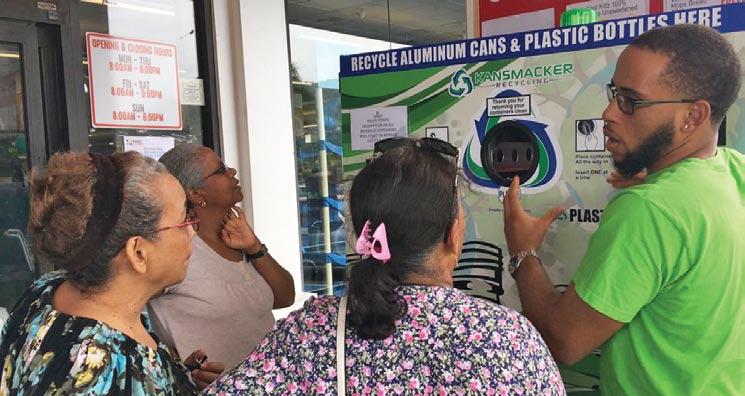
“We need a big company to jump on board with us and say, let’s go, and they can look as good as we do,” says Yono at Kansmacker’s Woodbrook office. “And then they have a story to tell. They can say, ‘We diverted five million bottles from going in the landfill.’ So as far as corporate social responsibility goes, we’re right up the alley.”
You can reach Kansmacker through kansmackerrecycling.com.
A Reverse Vending Machine in operation
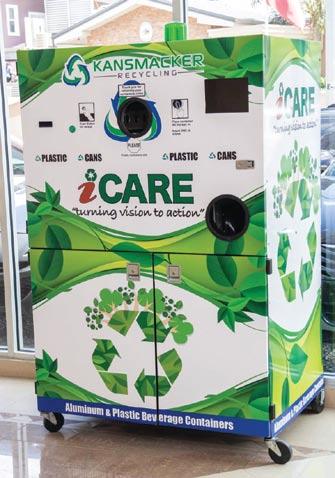
Your average vending machine spits out drinks. This one reclaims the plastic bottles and aluminum cans those drinks came in. Kansmacker’s machines scan your containers’ barcodes (so leave those labels on) and accept only the ones produced or imported by local companies.
Scanning eliminates the potential for fraud. (No one wants to create a system that accepts containers from neighbouring countries, for example, because you’d be paying for bottles and cans you didn’t collect deposits on.) It also collects data that’s important for evaluating the system’s success: How many “Jucees” were sold last year versus how many “Jucee” bottles were returned. And finally, it allows for the calculation of your rewards – so many dollars, or so many Massy points.
As for the narrative that refundable deposits would raise prices, Yono’s rebuttal is swift. “Nobody’s taking your money. The money’s right there for you to come back and get it. It’s just an insurance policy that that bottle comes back into the store and is recycled.”
Corporate Sustainability Review 63
Recyclers get a briefing on operating a Kansmacker recycling machine, and show off their points.
TRINIDAD AND TOBAGO CORPORATE CSR DIRECTORY
Name: Ansa Mcal Group of Companies
Address: Head Office, 11th Floor Tatil Building, 11 Maraval Road, Port of Spain
Contact: Ms. Sharon Balroop
Position: Manager, Corporate Communications
Phone: (868) 625-3670/ (868) 624-8753
E-Mail: Sharon.Balroop@ansamcal.com
Web: www.ansamcal.com
Name: Angostura Group of Companies
Address: Corner Eastern Main Road and Trinity Avenue, Laventille
Contact: Ms. Giselle Laronde-West
Position: Senior Manager, Public Affairs & Communications
Phone: (868) 623-1841 Ext. 257; (Fax) (868)-623-1847
E-Mail: glarondewest@angostura.com
Web: www.angostura.com
Name: Atlantic LNG Company of Trinidad and Tobago
Address: Princes Court, 4th Floor, Corner Keate & Pembroke Streets, Port of Spain
Contact: Ms. Camille Salandy
Position: Manager, Sustainability and Corporate Communications
Phone: (868) 624-2916; Fax (868) 624-8057
E-Mail: csalandy@atlanticlng.com
Web: www.atlanticlng.com
Name: BHP Billiton Trinidad &Tobago
Address: Invaders Bay Tower, Audrey Jeffers Highway, Port of Spain
Contact: Ms. Carla Noel-Mendez
Position: External Affairs/Community Manager, TTPU
Phone: (868) 821-5146 (Fax) (868) 635-9255
E-Mail: Carla.Noel-Mendez@bhpbilliton.com
Web: www.bhpbilliton.net
Name: BP Trinidad & Tobago LLC
Address: 5-5a Queen’s Park West, Port of Spain
Contact: Ms. Ronda Francis
Position: Manager, Corporate Responsibility
Phone: (868) 623-2862
E-Mail: franrh@bp.com
Web: www.bp.com
Name: Blink|B-Mobile (Foundation)
Address: TSTT House, 1 Edward Street, Port of Spain
Contact: Ms. Anjanie Ramesar Soom
Position: Manager, Corporate & Community Affairs
Phone: (868) 624-5703; (Fax) (868) 623-3836
E-Mail: aramesa@tstt.co.tt
Web: www.tstt.co.tt
Name: Blue Waters
Address: #2 Orange Grove Estate, Trincity
Contact: Mr. Pradeep Suvrin
Position: Sales & Marketing Manager
Phone: (868) 640-8824; (868) 289-8824
E-Mail: Pradeepsuvrin@bluewatterstt.com
Web: www.bluewaterstt.com
Name: Carib Glassworks
Address: Eastern Main Road, Champs Fleurs
Contact: Mr. Antron Forte
Position: Marketing Manager
Phone: (868) 662 2231; Fax: (868) 662 1779
E-Mail: antron.forte@caribglassworks.com
Web: www.caribglass.com
Name: Caribbean Airlines Ltd.
Address: Piarco International Airport, Piarco
Contact: Ms. Alicia Cabrera
Position: Senior Marketing Manager
Phone: (868) 669-3000 Ext. 2992; (Fax) (868) 669-1520
E-Mail: aliciacabrera@caribbean-airlines.com
Web: www.caribbean-airlines.com
64 Corporate Sustainability Review
Directory
Name: Centrica T&T Limited
Address: Eleven Albion, Corner Albion and Dare Street, Port of Spain
Contact: Mr. Ko Jacobs
Position: Country Manager
Phone: (868) 821-700
E-Mail: ko.jacobs@centrica.com
Web: www.centrica.com
Name: Citibank (Trinidad & Tobago) Limited
Address: 12 Queen’s Park East, Port of Spain
Contact: Ms. Lesley Taylor-Gouveia
Position: Public Affairs Officer
Phone: (868) 625-1040 Ext. 6906
E-Mail: Lesley.taylorgouveia@citi.com
Web: www.citibank.com/trinidad
Name: CL Financial Group
Address: 29 St. Vincent Street, Port of Spain
Contact: Ms. Crystal Lapope-Bradshaw
Position: Senior HR Officer
Phone: (868) 625-4444, Ext. 1217
E-Mail: crystall@clico.com
Web: www.clico.com
Name: Colonial Life Insurance Company (Trinidad) Limited
Address: 29 St. Vincent Street, Port of Spain
Contact: Mr. Gerard Barnes
Position: Senior Manager, Corporate Communications
Phone: (868) 625-4444 Ext. 1530; (Fax) (868) 625-4440 Ext 1621
E-Mail: gbarnes@clico.com
Web: www.clico.com
Name: Columbus Communications Trinidad Ltd. (FLOW)
Address: 29 Victoria Square, Port of Spain
Contact: Ms. Monique Mata
Position: Corporate Social Performance Specialist
Phone: (868) 224-2348
E-Mail: mmata@columbustrinidad.com
Web: www.columbustrinidad.com
Name: Unicomer (Trinidad) Ltd.
Address: 1 Courts Way, Calcutta Settlement #1 Freeport
Contact: Ms. Nicole Loney Mills
Position: Corporate Responsibility Officer
E-Mail: nicole-mills@unicomer.com
Web: www.unicomer.com
Name: Dansteel Ltd.
Address: South Trunk Road, La Romain
Contact: Mr. B. John
Position: Marketing Manager
Phone: (868)- 627-8335; (868) 623-6731
E-Mail: bjon@bhsil.com
Name: Digicel Trinidad & Tobago Ltd
Address: Ansa Centre, 11C Maraval Road, Port of Spain
Contact: Ms. Penny Gomez
Position: Corporate Communications Manager
Phone: (868) 355-5508
E-Mail: penny.gomez@digicelgroup.com
Web: www.digiceltt.com
Name: Direct TV Trinidad Limited
Address: 31 Mulchan Seuchan Road, Chaguanas
Contact: Ms. Tamara Ragoonath
Position: Marketing Manager
Phone: (868) 672-8111 Ext. 1410
E-Mail: tragoonath@directvtt.com
Web: www.directvcaribbean.com
Name: EOG Resources Trinidad Ltd.
Address: 10-12 Sweet Briar Road, St. Clair
Contact: Ms. Lisa Steele Pujadas
Position: Mgr. Corporate Communications & External Affairs
Phone: (868) 622-8653 Ext. 25652
E-Mail: lisa_steele-pujadas@eogresources.com
Web: www.eogresources.com
Name: First Citizens Bank
Address: 2nd Floor, DHL Building, Cor. Churchill Roosevelt Highway & El Socorro Extension Road, El Socorro
Contact: Ms. Jennifer Armstrong Khan
Position: Senior Communications Officer
Phone: (868) 623-4778 Ext. 5857
E-Mail: Jennifer.Armstrong-Khan@firstcitizenstt.com
Web: www.firstcitizens.com
Name: Flavorite Foods
Address: 128 Boundary Road, San Juan, PO Box 597, POS
Contact: Mr. Keenon Roper
Position: Marketing Manager
Phone: (868) 638-2236/7, 2221
E-Mail: kroper@flavoritefoodstt.com
Web: www.flavoritefoodstt.com
Corporate Sustainability Review 65
Name: HCL Group of Companies
Address: Long Circular Mall, Long Circular Road, St. James
Contact: Mr. Colin Carty
Position: Marketing Manager
Phone: (868) 622-4925; (Fax) (868) 628-7156
E-Mail: colin.carty@hcltt.com
Web: www.hcltt.com
Name: Happi Products
Address: 82 Bamboo Settlement #2, Valsayn
Contact: Mr. Brent Salick
Position: General Manager
Phone: (868) 645-5040, 645-5041, 645-5365
E-Mail: brent@happiproducts.com
Web: www.happiproducts.com
Name: Hilton Trinidad Hotel & Conference Centre
Address: 18 Lady Young Road, Belmont
Contact: Ms. Darlene McDonald
Position: Director, Sales and Marketing
Phone: (868) 624-3211 Ext. 6210
E-Mail: darlene.mcdonald@hilton.com
Web: www.hiltontrinidadhotel.com
Name: Hyatt Regency Hotel
Address: 1 Wrightson Road, Port of Spain
Contact: Ms. Neemah Persad-Celestine
Position: Marketing Manager
Phone: (868) 623-2222 Ext. 6467; (Fax) (868) 821-6401
E-Mail: neemahpersad.celestine@hyatt.com
Web: www.trinidad.hyatt.com
Name: IBM World Trade Corporation
Address: 91-93 St. Vincent Street, Port of Spain
Contact: Ms. Seiske Roberts
Position: Manager of Human Resources & Brand Services
Phone: (868) 624-5110 Ext (9) 6153; (Fax) (868) 625-6971
E-Mail: robertss@tt.ibm.com
Web: www.ibm.com
Name: K C Confectionery
Address: 95-97 Southern Main Road, Couva
Contact: Ms. Sharon Shah
Position: HR Manager
Phone: (868) 636-2360 ext. 229/3061
E-Mail: hr@kccandy.com
Web: www.kccandy.com
Name: Kenson Group of Companies
Address: 64-84 Lady Hailes Avenue, San Fernando
Contact: Ms. Nikeda Baker
Position: Human Resources Manager
Phone: (868) 657-2457; (868) 652-0095; (Fax) (868) 652-5906
E-Mail: nikeda_baker@kenson.co.tt
Web: www.kenson.co.tt
Name: Maritime Financial Group
Address: Maritime Centre, 29th Tenth Avenue, Barataria
Contact: Ms. Mika Ella Tang
Position: Marketing Coordinator
Phone: (868) 674-0130; (Fax) (868) 638-6663
E-Mail: mikatang@maritimefinancial.com
Web: www.maritimefinancial.com
Name: Methanex Trinidad Ltd.
Address: Maracaibo Drive, Pt. Lisas Estate Couva
Contact: Mr. Mario Singh
Position: Manager, Public Affairs
Phone: (868) 679-4400; Fax (868) 679-2400
E-Mail: msingh@methanex.com
Web: www.methnex.com
Name: National Flour Mills Ltd.
Address: 27-29 Wrightson Road, Port of Spain
Contact: Ms. Cheryl Lee Kong
Position: Marketing Manager
Phone: (868) 625-2416
E-Mail: cheryl.leekong@nfm.co.tt
Web: www.nfm.co.tt
Name: The National Gas Company
Address: Orinoco Drive, Pt. Lisas Industrial Estate, Couva
Contact: Ms. Joselle Gabby
Position: Ag. Head, Communications & Brand Management
Phone: (868) 636 4662; Fax: (868) 679 2384
E-Mail: joselle.gabbysirju@ngc.co.tt
Web: www.ngc.co.tt
Name: National Lotteries Control Board
Address: 119-121 Duke Street, Port of Spain
Contact: Ms. Amryl Rivers Rodriguez
Position: Marketing & Public Relations Officer
Phone: (868) 623-1831; (Fax) (868) 627-8030
Web: www.nlcb.co.tt
66 Corporate Sustainability Review
Name: Massy Group of Companies
Address: Level 1, Uptown Mall, Edward Street
Contact: Ms. Candace Ali
Position: Group Communication Officer
Phone: (868) 625-3426; (Fax) (868) 627-9061
E-Mail: candice.ali@massygroups.com
Web: www.neal-and-massy.com
Name: Nestle Trinidad & Tobago Ltd.
Address: Church Roosevelt Highway, Valsayn
Contact: Ms. Denise D’Abadie
Position: Manager, Corporate Social Responsibility
Phone: (868) 663-6832; (Fax) (868) 663-6840
E-Mail: denise.dabadie@cbr.nestle.com
Web: www.nestle.com
Name: Oscar Francois Ltd.
Address: 133-135 Duke Street, Port of Spain
Contact: Ms. Jackie Francois
Position: Chief Executive Officer
Phone: (868) 225-1635
E-Mail: info@oscarfrancois.com
Web: www.oscarfrancois.com
Name: Pan American Life Insurance (formerly ALGICO)
Address: 91-93 St. Vincent Street, Port of Spain
Contact: Ms. Cheryl-Ann Jordan
Position: VP, Human Resources
Phone: (868) 625-4426 ext. 3081
E-Mail: cjordan@palig.com
Web: www.palig.com
Name: Petroleum Company of T&T (Petrotrin) Ltd.
Address: #31 Casuarina Ave, Pointe-a-Pierre
Contact: Ms. Gillian Friday
Position: Manager, Corporate Communications
Phone: (868) 658-4200 Ext. 2026; (Fax) (868) 658-3775
E-Mail: gillian.friday@petrotrin.com
Web: www.petrotrini.com
Name: Power Generation Company of Trinidad and Tobago (Powergen) Limited
Address: 6a Queen’s Park West, Port of Spain
Contact: Ms. Marsha Mohammed
Position: Head, Legal Advisory Services
Phone: (868) 624-0383; Fax (868) 625-0983
E-Mail: m.mohammed@powergen.co.tt
Web: www.powergen.co.tt
Name: Repsol T&T Ltd.
Address: Repsol Tower, 4 Queen’s Park West, Port of Spain
Contact: Ms. Heidi Diquez
Position: Mgr. Corporate Communications & External Affairs
Phone: (868) 623-2244; (868) 623-1770; Fax) (868) 627-2753
E-Mail: HDIQUEZD@repsol.com
Web: www.repsol.com
Name: RBTT Financial (Caribbean) Limited
Address: St. Clair Place, 7-9 St. Clair Avenue, Port of Spain
Contact: Ms. Wendy Alleyne
Position: Senior Manager Brand and CSR
Phone: (868) 623 1322; (868) 624 7288
E-Mail: anna-maria.kurbanali@rbc.com
Web: www.rbc.com
Name: Republic Bank Limited
Address: 9-17 Park Street, Port of Spain
Contact: Ms. Michelle Palmer-Keizer
Position: Group Corporate Communications Manager
Phone: (868) 625-4411; (868) 625-4425
E-Mail: mpalmerkeizer@republictt.com
Web: www.republictt.com
Name: S.C.G International Limited
Address: #5 Keate Street, Port of Spain
Contact: Ms. Ray Pan
Position: Marketing Manager
Phone: (868) 625- 7388/ (868) 780- 8252
Fax: (868) 623- 4056
E-Mail: info@scg.caribbean.com
Web: www.scg.caribbean.com
Name: Sagicor Life Inc. (Trinidad & Tobago)
Address: 16 Queen’s Park West, Port of Spain
Contact: Ms. Marlene Chin
Position: Manager, Corporate Communications
Phone: (868) 628-2652; (868) 624-4754
E-Mail: Marlene-Chin@sagicor.com
Web: www.sagicorlife.com
Name: Scotiabank Trinidad & Tobago Ltd.
Address: 56-58 Richmond Street, Port of Spain
Contact: Ms Cindy Mohammed
Position: General Manager, Scotiabank Foundation
Phone: ((868) 627-2684; Fax (868) 627-5278
E-Mail: cindy.mohammed@scotiabank.com
Web: www.scotiabank.com
Corporate Sustainability Review 67
Name: Shell Trinidad & Tobago
Address: 5 St. Clair Avenue, Port of Spain
Contact: Mrs, Candace Clarke-Saloum
Position: Head, External Relations
Phone: (868) 628-0888; (Fax) 622-6520
E-Mail: c.clarke-saloum@shell.com
Web: www.shell-group.com
Name: SM Jaleel & Company Limited
Address: Otaheite Industrial Estate, South Oropouche
Contact: Mr. Naim Mohammed
Position: Group Head of Recruitment & Employer Branding
Phone: (868) 677-7520; (868) 677-7523; (Fax) (868) 677-7825
E-Mail: roger.bertely@smjaleel.com
Web: www.smjaleel.com
Name: Telecommunications Services of Trinidad & Tobago (TSTT)
Address: 52 Jerningham Avenue, Belmont
Contact: Ms. Camile Campbell
Position: Marketing Officer
Phone: (868) 624-8788; (868) 800-2255
E-Mail: ccampbe1@tstt.co.tt
Web: www.tstt.co.tt
Name: Trinidad Cement Ltd.
Address: Southern Main Road, Claxton Bay
Contact: Ms. Maria Lewis
Position: Community Relations Officer
Phone: (868) 659-2381
E-Mail: marial@tclgroup.com
Web: www.tcl.co.tt
Name: Trinidad & Tobago National Petroleum Company (NP)
Address: Sea Lots, Port of Spain
Contact: Ms. Rae Kelly Gilbert
Position: Manager, Corporate Communications
Phone: (868) 625-1364
E-Mail: rgilbert@np.co.tt
Web: www.np.co.tt
Name: Trinidad & Tobago Electricity Commission (T&TEC)
Address: 63 Frederick Street, Port of Spain
Contact: Ms. Annabelle Brasnell
Position: Corporate Communications Manager
Phone: (868) 623-6291; (Fax) (868) 624-3724
E-Mail: abrasnell@ttec.co.tt
Web: www.ttec.co.tt
Name: Trinidad & Tobago Postal Corporation (TT Post)
Address: Golden Grove Road, Piarco
Contact: Mr. Ryan David
Position: Business Development Manager
Phone: (868) 669-5361/ (868) 800-7678
E-Mail: ryan.david@ttpost.net
Web: www.ttpost.net
Name: Trinidad & Tobago Unit Trust Corporation (UTC)
Address: 82 Independence Square, Port of Spain
Contact: Ms. Natasha Davis
Position: Vice President, Reputation Management
Phone: (868) 625-8648
E-Mail: ndavis@ttutc.com
Web: www.ttutc.com
Name: Unilever Caribbean Ltd.
Address: Eastern Main Road, Champs Fleurs
Contact: Ms. Helen Julien
Position: Administrative Assistant, HR Department
Phone: (868) 663-1787 Ext. 2205; (Fax) (868) 662-1780
E-Mail: Helen.julien@unilever.com
Web: www.unilever.tt
Name: West Indian Tobacco Company (WITCO)
Address: Eastern Main Road, Champs Fleurs
Contact: Ms. Josiane Khan
Position: Corporate & Legal Services
Phone: (868) 662-2271/72
E-Mail: josiane_khan@ttma.com
Web: www.ttma.com
Name: Water & Sewerage Authority (WASA)
Address: Eastern Main Road, St. Joseph
Contact: Mr. Daniel Plenty
Position: Senior Manager
Phone: (868) 662-9272; (868) 223-1000-6
E-Mail: Plen1059@wasa.gove.tt
Web: www.wasa.gov.tt
To get listed here, email: team@virtual-tt.com
68 Corporate Sustainability Review






Over 20 years experience in international media relations and content generation. Expert PR provides you with target accurate media placement and creates a expanded business #268 Harold Fraser Crescent, Valsayn, Trinidad | (868) 645-0368/(868) 686-9797 | hutchlin@gmail.com | caribbean-pr-agency.com


















































































 by Monique Mata
by Monique Mata


























